MIDEI CHODESH Sounds of the Soul
Rabb Shmuel Goldin Page 34
B'CHODSHO
Is This Any Way to Introduce a Hero?
BY RABBI SHMUEL GOLDIN

The King's Garden: Understanding the Duality of Body and Soul
Faculty, OU Israel
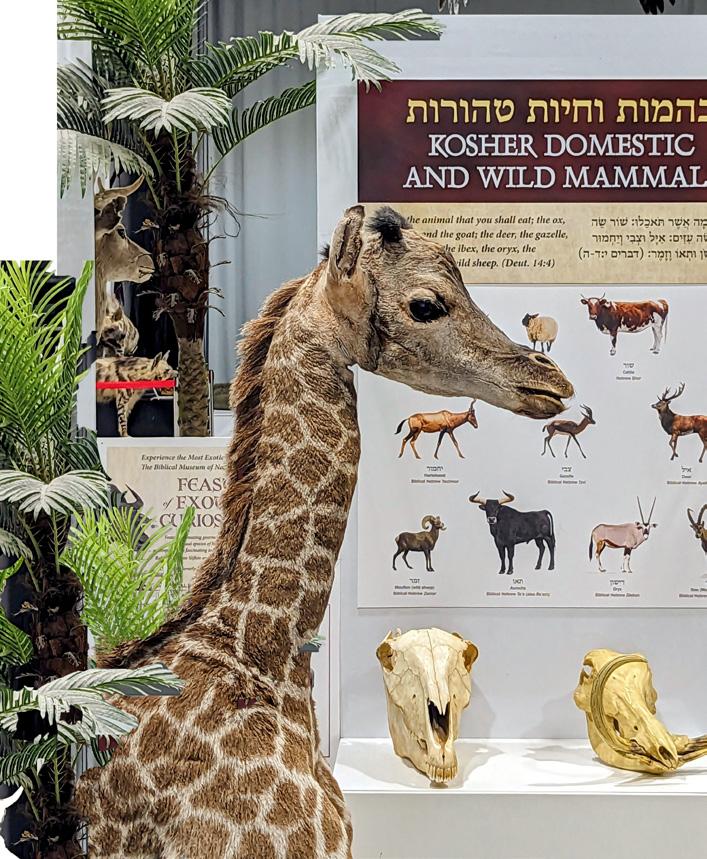
Rebbetzin Dr. Adina Shmidman. Page 54
Rabbi Emeritus, Congregation Ahavath

Torah, Englewood NJ
Parsha that follows (why the information is given at that particular point is the subject of another article).

If the information concerning Moshe’s lineage is eventually shared, why is it left out in the first place?
Numerous commentaries address the issues before us… Working within

YERUSHALAYIM SHABBAT TIMES PARSHAT RE'EH CANDLES 6:52PM • EARLIEST 6:03PM • HAVDALA 8:05PM • RABBEINU TAM 8:44PM ה"ב ISSUE 1528 ADVERTISING & SPONSORSHIPS 02-560-9125 TorahTidbits.com OU ISRAEL 02-560-9100 AVOT CHAPTER 6 ▪ SHABBAT MEVARCHIM 12 AUGUST 2023 ▪ ג"פשת בא ה"כ האר תשרפ PARSHAT RE'EH ד:די םירבד ולכאת רשא המהבה תאז
of pshat,
the realm
the
Table of Contents
04 Dear Torah Tidbits Family
08
12
20
24
Rabbi Avi Berman
Re'eh - The True Reward
Rabbi Moshe Hauer
Aliya By Aliya Sedra Summary
Rabbi Reuven Tradburks
The Thief of Blessings
Rabbi Dr. Tzvi Hersh Weinreb
The Deep Power of Joy
Rabbi Lord Jonathan Sacks zt"l
32 OU Israel Schedule
34
Sounds of the Soul
Rabbi Shmuel Goldin
38 Probing the Prophets
40
Rabbi Nachman Winkler
Ensuring A "Safer" Torah
Rabbi Shalom Rosner
42 The Daily Portion Sivan Rahav-Meir
HELPFUL REMINDERS
44 Tremendous Tzedakah
Rebbetzin Shira Smiles
46 "Give Surely..."
Rabbi Judah Mischel
48 Simchat Shmuel
Rabbi Sam Shor
50 Recovering A Lost Voice
Rabbi Moshe Taragin
54 The King's Garden: Understanding the Duality of Body and Soul
Rebbetzin Dr. Adina Shmidman
56 Can One Fix an Unwarranted Beracha on Netilat Yadayim?
Rabbi Daniel Mann
58 Pruning Peaches During Shemittah Within the Otzar Beit Din Framework
Rabbi Moshe Bloom
60
The Y-Files Weekly Comic Netanel Epstein
62 Torah 4 Teens by Teens
Rabbi Yosef Ginsberg // Noya Schleider
With the onset of the month of Elul we begin to recite LaDavid Hashem Ori both evening and morning. We also sound the Shofar throughout the month each morning
Rosh Chodesh Elul is on Thursday August 17 and Friday August 18
Earliest Kiddush Levana 3 Days After Molad 3 Elul/ Sat. night Aug. 19
7 Days After Molad 7 Elul/ Wed. night ,Aug. 23
Last Opportunity to Say Kiddush Levana until 14 Elul, Wed. night. Aug. 30, all night
THIS WEEK'S COVER IMAGE!
giraffe
www.BiblicalNaturalHistory.org

2 TORAH TIDBITS 1528 / RE'EH
Photographd by Rabbi Dr. Natan Slifkin Director, The Biblical Museum of Natural History
A
in the Hall of Kosher Classification, at the Biblical Museum of Natural History in Har Tuv, Israel.
לארשי לכ לעו ונילע אבה ישש םויבו ישימח םויב היהי לולא שדח שאר ברעב שמח ירחא םיקלח רשע העבשו תוקד עברא יעיבר םויב היהי לולא שדוח דלומ
הבוטל
CANDLE LIGHTING OTHER
JERUSALEM
All Times According to MyZmanim (20 mins before Sunset in most Cities; 40 mins in Yerushalyim and Petach Tikva; 30 mins in Tzfat and Haifa)
Daf Yomi this Shabbat: Gittin 88
OU Kashrut NCSY Jewish Action JLIC NJCD / Yachad / Our Way OU West Coast OU Press Synagogue/Community Services OU Advocacy OU Israel
MITCHEL R. AEDER, PRESIDENT OF THE ORTHODOX UNION Yehuda Neuberger, Chairman of the Board, Orthodox Union | Dr. Josh Penn, OU Kashrus Commission
RABBI MOSHE HAUER, EXECUTIVE VICE PRESIDENT | RABBI JOSHUA M. JOSEPH, ED.D.
EXECUTIVE VICE PRESIDENT & CHIEF OPERATING OFFICER Rabbi Dr. Tzvi Hersh Weinreb, Exec. V.P. Emeritus
OU KOSHER: Rabbi Menachem Genack, CEO/Rabbinic Administrator OU Kosher | Rabbi Moshe Elefant, COO/Executive Rabbinic Coordinator ISRAEL: Rabbi Yissachar Dov Krakowski, Rabbinic Administrator | Rabbi Ezra Friedman, The Gustave and Carol Jacobs Center for Kashrut Education/ Deputy Rabbinic Administrator
Headquarters: 40 Rector St. 4th floor, New York, NY 10006 212-563-4000 website: www.ou.org
Editor Emeritus: Phil Chernofsky
Editor: Rabbi Aaron Goldscheider | aarong@ouisrael.org
Advertising: Ita Rochel | 02-5609125 or ttads@ouisrael.org
Website: www.torahtidbits.com
Not getting enough TTs? Too many? None at all?
Contact our DISTRIBUTION 050-577-2111 • ttdist@ouisrael.org
Seymour J. Abrams • Orthodox Union Jerusalem World Center • Avrom Silver Jerusalem College for Adults • Wolinetz
Family Shul • Makom BaLev • Birthright • Yachad • NCSY in Israel • JLIC in Israel • Camp Dror • Pearl & Harold M. Jacobs ZULA Outreach Center • The Jack Gindi Oraita Program • OU Israel Kashrut
STUART HERSHKOWITZ, PRESIDENT OU ISRAEL Zvi Sand / Yitzchak Fund: Former Presidents, OU Israel | Rabbi Emanuel Quint z”l, Senior Vice President | Prof. Meni Koslowsky, Vice President
VAAD MEMBERS:

Michael Elman | Yonatan Frankel | Yitzchak Fund | Daniella Hellerstein | Stuart Hershkowitz | Jeremy Lustman | Meir Raskas | Atara Reichel | Zvi Sand | Norman Schmutter | Mark Schneider | Esther Williams
RABBI AVI BERMAN, EXECUTIVE DIRECTOR, OU ISRAEL
David Katz, CFO, OU Israel | Chaim Pelzner, Director of Programs, OU Israel | Rabbi Sam Shor, Director of Programs, OU Israel Center | Rabbi Sholom Gold zt"l, Dean, Avrom Silver Jerusalem College for Adults
22 Keren HaYesod <> POB 1441 <> Jerusalem 9101032
phone: (02) 560 9100 | fax: (02) 561-7432
email: office@ouisrael.org
website: www.ouisrael.org
Founders and initial benefactors of the OU Israel Center: George and Ilse Falk a"h
Torah Tidbits and many of the projects of OU Israel are assisted by grants from THE JERUSALEM MUNICIPALITY
OU Israel, Torah Tidbits does not endorse the political or halachic positions of its editor, columnists or advertisers, nor guarantee the quality of advertised services or products. Nor do we endorse the kashrut of hotels, restaurants, caterers or food products that are advertised in TT (except, of course, those under OU-Israel hashgacha). Any "promises" made in ads are the sole responsibility of the advertisers and not that of OU Israel, the OU Israel Center , Torah Tidbits.
OU ISRAEL CENTER 3 SHOFTIM RE'EH HAVDALA EARLY CANDLES HAVDALA EARLY CANDLES 7:57 5:57 6:44 8:05 6:03 6:52 Yerushalayim / Maale Adumim 7:59 5:59 7:02 8:07 6:05 7:09 Aza Area (Netivot, Sderot et al) 7:58 5:58 7:03 8:06 6:04 7:10 Beit Shemesh / RBS 7:58 5:57 7:00 8:05 6:03 7:07 Alon Shvut 7:59 5:59 7:01 8:08 6:05 7:09 Raanana / Tel Mond / Herzliya / K. Saba 7:58 5:58 7:00 8:06 6:04 7:08 Modiin / Chashmonaim 8:00 5:59 7:02 8:08 6:05 7:09 Netanya 7:58 5:58 7:01 8:06 6:04 7:08 Be’er Sheva 7:59 5:59 7:01 8:07 6:05 7:09 Rehovot 7:59 5:59 6:44 8:07 6:05 6:52 Petach Tikva 7:59 5:58 7:01 8:07 6:04 7:08 Ginot Shomron 8:00 5:59 6:52 8:09 6:06 6:59 Haifa / Zichron 7:58 5:57 7:00 8:06 6:03 7:07 Gush Shiloh 8:00 5:59 7:02 8:08 6:05 7:09 Tel Aviv / Givat Shmuel 7:58 5:57 7:04 8:06 6:03 7:11 Givat Zeev 7:57 5:57 7:02 8:05 6:03 7:07 Chevron / Kiryat Arba 8:00 5:59 7:02 8:08 6:06 7:09 Ashkelon 7:59 5:59 7:01 8:07 6:05 7:08 Yad Binyamin 7:58 5:57 6:55 8:07 6:03 7:03 Tzfat / Bikat HaYarden 7:57 5:57 6:59 8:06 6:03 7:07 Golan 8:00 5:59 7:01 8:08 6:05 7:08 Nahariya/Maalot 7:59 5:58 7:00 8:07 6:04 7:08 Afula Rabbeinu Tam (Jerusalem) - 8:44PM • Next Week - 8:36PM
HAVDALA
AND
TIMES
Z'MANIM
Ranges 11 days Wed - Shabbat August 9 - 19 / 22 Av - 2 Elul Earliest Tallit and Tefillin 5:05 - 5:13 Sunrise 6:00 - 6:06 Sof Zman Kriat Shema 9:22 - 9:24 Magen Avraham 8:42 - 8:45 Sof Zman Tefila 10:29 - 10:30 (According to the Gra and Baal HaTanya) Chatzot (Halachic Noon) 12:44 - 12:42 Mincha Gedola (Earliest Mincha) 1:18 - 1:15 Plag Mincha 6:05 - 5:56 Sunset (Including Elevation) 7:33 - 7:23
DEAR TORAH TIDBITS FAMILY
RABBI AVI BERMAN Executive Director, OU Israel

At the start of every summer I find myself eagerly awaiting the arrival of thousands of Jews who fill Israel’s streets as they reconnect with their heritage. Among them include 17 NCSY Summer programs, five of which are brand new programs catering to the evolving needs and interests of today’s teenagers. I had the privilege of spending time with many of the groups and am eager to share with you some of the elements that left me feeling inspired and hopeful about the future of Am Yisrael.

Back in 1998, NCSY created The Jerusalem Journey (TJJ) led by Rabbi Bentzion (Barry) Goldfischer. The program, known today as the Anne Samson Jerusalem Journey, which offered public school kids the opportunity to tour Israel, was heavily sponsored by donors to offset costs. During the years of the Intifada, the program came to a halt.
Once I began my role in Vancouver, British Columbia, serving as the Northwest Regional Director of NCSY in 2001, I began working with public school teens and quickly saw the overwhelming needs of igniting the spark of yiddishkeit in them. Unlike in the yeshiva day school system where NCSY and the OU were relatively known, public schools were an entirely
different ballgame. We focused on getting these public school teens to attend regular NCSY programming which included Latte and Learnings, Shabbatonim , holiday programs and frequent conversations, including calling each teen every erev Shabbat. Yet, there was still something missing. Yeshiva day school teens had summer programs that brought Judaism to life, but there were no such programs available for public school teens.
In 2004, the OU/ NCSY held a conference during which we discussed Jewish public school programming and the need to bring back TJJ. I worked together with my good friend Rabbi Steve Burg, who served as the West Coast Regional Director, to relaunch the program that very summer for North American teens. We celebrated with every registration, and then rushed to secure sponsorships for each participant.
In TJJ’s first year returning from the Intifada hiatus, Rabbi Burg and I led buses filled with students from across North America. We began the trip in Prague and visited the Terezín Concentration Camp to give them a taste of what we lost. We taught the students about the influence of the Maharal, showed them many old
4 TORAH TIDBITS 1528 / RE'EH
synagogues and the school yards bustling with life once more. The start of the trip set the tone for the students. Seeing the elation on their faces as our plane touched the holy ground of Israel, the ultimate proof of our triumph, was deeply moving.
Once we began touring Eretz Yisrael, I found myself experiencing the Land in a new way as I watched the students uncover its wonders. Moreover, many of the students on the trip were ones who previously joined me on NCSY Shabbatons to Seattle, Los Angeles and Edmonton. While each of those Shabbatons proved impactful, spending four weeks with them touring Israel together allowed us to create strong bonds which reinforced Jewish ideals.
Following its successful first year, TJJ quickly became an ambitious NCSY Summer program, with applications growing by the year. This past Sunday night, I attended a gathering of NCSY Summer programs which was segmented by boys programs, girls programs and TJJ. The size of the TJJ group, which totaled 1,000 participants, was incredible. Reflecting on my experience recruiting teenagers to join TJJ, I have a tremendous amount of respect for the rabbis, mentors, advisors and staff members who continue to pound the pavement in public school hallways across the United States in an effort to bring Jewish children Home. To reach 1,000 participants and bring them to Israel - a number which
I have no doubt will grow even more next summer - must have taken countless hours and dedication. I wish a tremendous kol HaKavod to the dedicated staff members and advisors who have given their all to create a meaningful experience for each and every NCSY teen this summer.
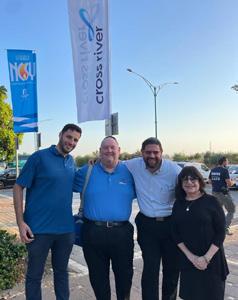
Also in attendance were OU Israel President Mitch Aeder, NCSY International Director Rabbi Greenland, Director of NCSY Summer David Cutler, and OU Israel North American Director of Development, Mimi Jankovits. Watching the crowd we reflected on the growth of TJJ, which now includes TJJ Moms, TJJ Dads and even TJJ Ambassadors. What was clear to us is how many experiences these teenagers would have missed out on without the founding of the OU and the continuous development of NCSY Summer programs.
Another of the many incredible NCSY Summer programs is Michlelet, a program for teenage girls run by Rebbitzin Rivka Yudin. The program offers intensive learning and chesed opportunities while
Deeply missed by her family, friends and students
Wohl, Goldman and Berl families
OU ISRAEL CENTER 5
In
memory
ה”ע ה”ע רלוז תיבל הביר רתסאו םהרבא תב הוח עגייפ on her 10th yahrzeit - בא םחנמ ג”כ
loving
of Phyllis Goldman
exposing participants to the beauty of Eretz Yisrael. Beyond its exceptional pro gramming, Michlelet teens engage in an unforgettable act of chesed each summer - making a bridal shower and wedding for an Israeli bride whose own family does not have the funds to do so. The wedding is hosted at the Michlelet campus and the girls do everything from preparing the bridal shower, decorating the bride’s chair and chuppah, waitressing and serv ing at the event, and adding a tremen dous amount of ruach and simcha for all those attending.
Perhaps what is even more impressive is the fact that wedding guests have no idea that the North American teens dancing for the kallah were the very ones who put together the simcha from start to finish. With their act of chesed these students help support a young couple build their home in Israel. What a zechut.
At the OU we are constantly challenged with the mission of fortifying the future of Am Yisrael. Seeing the throngs of American teens flood the streets of Israel while engaging in exceptional acts of chesed for their brothers and sisters living here, I am inspired by the impact the organization and its donors have had thus far. May we continue to see the impact of our efforts and merit to welcome the Mashiach very soon.
Wishing you all an uplifting and inspiring Shabbat,
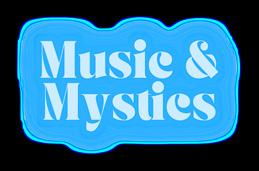
 Rabbi Avi Berman Executive Director, OU Israel aberman@ouisrael.org
Rabbi Avi Berman Executive Director, OU Israel aberman@ouisrael.org



6 TORAH TIDBITS 1528 / RE'EH
$250 All-Inclusive For More Info: H o u s i n g M e a l s P r o g r a m m i n g During Tzfat's 2023 Klezmer Music Festival A Spiritual Journey into Your Jewish Roots August 20-27 livnot.org/israel-retreats AGES 21-32 AGES 21-32 a r i @ l i v n o t o r g * F o r p e o p l e w i t h l i t t l e t o n o j e w i s h b a c k g r o u n d ORDER ONLINE AND GET THE PRODUCTS YOU PREFER DELIVERED STRAIGHT TO YOUR DOOR! ORDER TODAY AND ENJOY SUPERIOR QUALITY, SELECTION AND SERVICE! Use coupon code welcome2ftf and save 5% off your first order! www.FarmToFamily.co.il Netanel 050-344-6261 | Office 058-444-6260 American Service! Want to shop from the convenience of your home? American Products & Specialty Items! Top quality, organic & regular Mehadrin produce
when what those purpose next very the heard.
Anglo-populated, sunny Ashkelon is the answer!

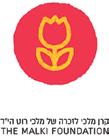

It’s very affordable – from $500,000 with just a 15% down payment, mortgages available as well as bank guarantees. Rental income often in excess of 3.5%.





THE BEST DESIGN, ENGINEERING AND INSTALLATION OF AIR CONDITIONING SYSTEMS.



JUST ASK ANY OF OUR THOUSANDS OF HAPPY CLIENTS.




OU ISRAEL CENTER 7 True wholesaler from the diamond boursa with over 25 years experience member diamond dealers club Engagement Rings ∙ Stud Earrings Pendants ∙ Tennis Bracelets 050-573-9061 jeffmor36@gmail.com www.JeffMorDiamondJewelry.com KNOW WHAT TO ANSWER FREE COUNTER-MISSIONARY Videos • Weekly Insights • Booklets • Counseling Rabbi Bentzion Kravitz • info@JewsforJudaism.org kerenmalki.org 02-567-0602
Malki empowers families of children with special needs in Israel to choose home care. Donations are tax-approved in Israel, US and UK. Honoring the
of
Chana Roth ד”יה 1985-2001, killed in
Sbarro bombing. OU ISRAEL CENTER 7
the to
G-d,
people oppo-
tell My MarSea Modest Swim & Casualwear www.MarSeaModest.net (NIS) www.MarSeaModest.com ($USD) Marci Rapp 050-424-8359 JLEM 02-628-8282 I TLV 03-720-8000 tzviair.com
Keren
memory
Malka
the
accept his is the
his humility.
as-
d av i d z @A s h ke l o n P r o p e r t i e s . c o m L I V E O P P O S I T E T H E S E A 0 5 4 4 - 3 3 2 6 2 1
OU EXECUTIVE VICE PRESIDENT
Re’eh – The True Reward
Years ago, I would spend ten days each summer at a program known as Sinai Retreats, spending a nice chunk of each day teaching Torah to a group of intelligent young professionals who had not previously had that opportunity. We studied and discussed core Torah concepts and ideas about the G-d we believe in, the mission of the nation we are a part of, the challenges and opportunities of life, and the Torah that we are to dedicate ourselves to study and practice. The opportunity to spend hours day after day in an immersive Torah environment sharing the incredible wisdom and strength of the Torah and the meaning and purpose that it gives our lives renewed my own appreciation for the Torah that we live and learn each day. Ashreinu mah tov chelkeinu, we are indeed very fortunate.
Many understand this to be the meaning of the opening phrases of our Parsha (Devarim 11:26-27). Rather than spell out external rewards and consequences for our observance of Torah, Moshe zeroes in on the ultimate blessing, the Torah itself. “See, this day I set before you blessing and curse: blessing, that you hear the commandments of Hashem your God that I place before you today….” As Rambam notes in many places (see for example
introduction to Rambam’s commentary to Perek Chelek and Hilchot Teshuva Chapter 10), our appreciation of and connection to Torah ultimately depends on our level of appreciation for its inherent value. In the words of Pirkei Avot (4:2), s’char mitzvah mitzvah, the ultimate reward of doing a Mitzvah is the Mitzvah itself.

Ramban very simply and beautifully underscores the value of our awareness of the inherent benefits of Torah in last week’s Parsha (10:12-13):
“And now, O Israel, what does Hashem your God demand of you? Only this: to revere Hashem your God, to walk only in His paths, to love Him, and to serve Hashem your God with all your heart and
8 TORAH TIDBITS 1528 / RE'EH FROM THE DESK OF
RABBI MOSHE HAUER
the learning from this issue of TT be ןהתומשנ וליעל Of our beloved Mothers both pillars of our lives Edith Glattstein Schwartz ה”ע ה”ע יבצ הדוהיו הנח תב הכלמ הקבר בא םחנמ ’כ May Pitasky Parker ה”ע ה”ע לאלצבו האל תב םירמ בא םחנמ ז”כ In loving memory Tzillah and Zvi Schwartz and families
May
soul, keeping Hashem’s commandments and laws that I instruct you in today, for your good.”
Ramban notes - as the Talmud had previously - how odd it seems that this phrase can begin with an apparent minimization of what Hashem demands of us when in fact the list of expectations is long and imposing. Yet, noted the Ramban, the key lies in seeing how the entire statement is anchored in its closing phrase, “for your good.” The Torah is big and broad and its obligations many, but once we can recognize and taste the incredible benefit it provides us in our own lives, its observance moves immediately from burden to privilege. It is not a burden when we can truly appreciate its incredible benefits.


Each of us benefit greatly from taking every opportunity to learn Torah in a way that refreshes our own enthusiasm for it and that brings its light and its power both to those outside our community who have never seen it as well as to those inside our own family and community who have seen it but never fully tasted it. This will help all of us who have grown accustomed to the gift of Torah life and forgotten its privilege. Ashreinu mah tov chelkeinu! We are indeed very fortunate.

LIFE SETTLEMENTS
Do you have a life insurance policy you:
• No longer want?
• No longer need?
• Can no longer afford the premium?
• Could you use extra money instead of keeping your policy?


I can guarantee that if you qualify with the underwriting process I can get you more money than if you cash it in with the company.
Please contact Moshe Russell at: Buymypolicy32@gmail.com
OU ISRAEL CENTER 9
L I V E O P P O S I T E T H E S E A david z@A shkelo nPropert ie s.c om c a l l D a v i d a t 0 5 4 - 4 3 3 - 2 6 2 1 www.a shkelo nproperti es.c om C o n t a c t u s f o r t h e l a r g e s t s e l e c t i o n o f s e a - v i e w p r o p e r t i e s f o r s a l e o r r e n t
People ask for the “price per square meter ” on our amazing Ashkelon sea-front proper ties... they don’t realize that price is set by how fabulous our exclusive sea views are!

for rent
Pinsker building - 4 rooms, fully renovated. Electrical appliances, closets, Succa, parking, Shabbat elevator, immediate
Rechavia Wolfson towers4 rooms, 100m, renovated, high floor
Pinsker 22: 4 rooms, 115m renovated, high floor, 3 exposures., electrical appliances, closets, Succa, parking, central a/c, long term. Price $3400/ month - immediate.

5 rooms, 136m, renovated, high floor
Pinsker building - 4 rooms, fully renovated. Electrical appliances, closets, Succa, parking, Shabbat elevator, immediate Rechavia Wolfson towers4 rooms, 100m, renovated, high floor
5 rooms, 136m, renovated, high floor
San Simon - 60 Ben Zakkai: 3.5 rooms, 4th floor, unfurnished, bright. Price: 5100nis.

San simon - New 7 room duplex penthouse of 300m, Succa balcony, Shabbat elevator, parking, machsan
San simon - New 7 room duplex penthouse of 300m, Succa balcony, Shabbat elevator, parking, machsan
for sale
for rent for sale
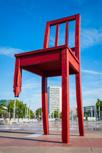
Katamon - Near shteiblach, 4 room apt., 1st floor, well kept, bright, 3 exposures, parking
Old Katamon - Gdud Haivri: 4 rooms, 9 steps down, well kept, 3 exposures, bright. Price 3.4m nis.
Gdud Haivri - 4 rooms, for renovation, 3 exposures, 9 steps to apt., car park, immediate
Katamon - Near shteiblach, 4 room apt., 1st floor, well kept, bright, 3 exposures, parking
Gdud Haivri - 4 rooms, for renovation, 3 exposures, 9 steps to apt., car park, immediate


German Colony - Hamelitz St.: 3 rooms, 92m, 1st floor, well kept, 3 exposures, elevator, car park, storage, handicap accessible. Price 4.45m nis.
052-2639702 | www.shneller.co.il Shiffy@shneller co.il
052-2639702 | www.shneller.co.il

Shiffy@shneller co.il

11 **************** RESTORE YOUR FURNITURE TO HEALTH **************** Website: www.thefurnituredoctor.co.il Email: office@thefurnituredoctor.co.il Phone: 02-999-2418 WhatsApp: 058 787 3755 125th YEAR ANNIVERSARY SUMMER PROMOTION Fix from 1 to 4 chairs and get 15% off * Fix 5 or more chairs and get 20% off* Free standard leg tips + installation on all chair repairs* *All current promotions valid until August 31, 2023. One promotion per customer
ALIYA-BY-ALIYA SEDRA SUMMARY
RABBI REUVEN TRADBURKS RCA ISRAEL REGION

PARSHAT RE'EH
Parshat Re’eh begins a section filled with Mitzvot. In the next 3 parshiot there are 170 Mitzvot, ¼ of all the mitzvoth of the Torah. In the flow of Moshe’s speech, he pivots from a discussion of how we got to where we are to a discussion of how we are to live in the Land. No more speaking about it; now we are speaking of it, the creation of the Jewish society in the Land. In the first 3 parshiot of Devarim he reviewed our history and its lessons. If you doubt you can take the Land, remember the sin of the spies; don’t repeat their skepticism. If you doubt your ability, remember your victories over Sichon and Og. If you are worried that the nations are too powerful for you, remember the wonders of Egypt; He will do what is necessary. If you doubt your worth, remember Sinai; He chose to speak with you, His people. And if you think you are superior, remember your failing of the golden calf. These first 3 parshiot address the thoughts, doubts, and concerns in the minds of the people; Moshe assuages those uncertainties through recounting the lessons of their journey to here. Now Moshe begins to address the society we want to
Happy Chai Aliyah Anniversary!
Michael & Channie Greenberg
Becca, Daniel, Naomi, and Benjamin
build in the Land. What are the pillars of this new society? What are its features? Its principles, its values. It is this that Moshe addresses now, through the language of Mitzvot. It is to be a G-d centered society. Your loyalty to G-d will be challenged; it must be vigilantly protected. And a society of generosity.
1ST ALIYA (DEVARIM 11:26 - 12:10)
I place before you blessing as a consequence of keeping mitzvoth; and curse as a consequence for not. You are entering the Land and will establish yourself there. These are the laws: rid the Land of idols whether they are on mountains, hills or under trees. And hence uproot service of them. Do not serve your G-d in many places rather serve Him in the one place I choose. That is where you shall bring all your offerings. And that is where you shall rejoice.
We are introduced here for the first time to the notion of one Temple; there is one and only one place of national service of G-d. By having just one place, we reinforce that there is but one G-d. And we are introduced to the notion of simcha. In serving G-d in this one central place, you will have simcha. Simcha is the inner joy, the satisfaction, elation of standing before G-d. True joy is the sense that our lives have meaning, that we have a treasured relationship with G-d and He with us; nothing could be more meaningful or more satisfying. That is simcha, inner joy.
12 TORAH TIDBITS 1528 / RE'EH
2ND ALIYA (12:11 - 28)
more about patient self-control than physical might. It is found in the Talmudic tractate Kiddushin 40a, where the tale is told about a certain Rabbi Zadok, who resists the attempts of a particularly powerful noblewoman to lead him astray. He exerts moral strength, and to him the Talmud applies the following biblical verse: "Bless the Lord, O His angels, mighty creatures who do His bidding, ever obedient to His bidding. Bless the Lord, all His hosts, His servants who do His will." (Psalms 103:20-21)
The place that G-d will choose to dwell shall be the place you bring your offerings. And you shall rejoice there with your family, your workers and the Levi. Now, you may consume meat wherever you dwell, but not as holy offerings. The holy things are to be done in this one place only. When you enjoy expansive borders and want to consume meat, you may do so without any restrictions of tuma. However, do not consume the blood. You may not offer holy things and vows in your locale, but only in the place He chooses.
JERUSALEM SALES
SHAAREI CHESSED / RECHAVIA
*Duplex! 5 bdrms, 25 sqm kitchen, succah, shabbat elevator, 2 parking, storage.
*Renovated 110 sqm 3 bdrms, 1st floor, succah.
*New 228 sqm duplex penthouse, 30 sqm succah, shabbat elevator, parking, view.
TALBIEH-250 sqm+200 sqm garden, priv. land
OLD KATAMON
160 sqm 4 bdrms, garden, storage, parking, Occupancy - 1.5 years.
ARNONA
New renovated 2 bdrms, large balcony, elevator, storage, parking. Can be sold furnished
TALPIOT
4 rms, balcony, elevator, machsan, parking, view.
NACHLAOT
2 rms, priv entr, storage room, NIS 2,210,000
HAR NOF -New listings!
Isaac's way recognizes the necessity for great patience and forbearance. If we adopt Isaac's way, we must be prepared for a lengthy process before our challenges are resolved. In the words of Rabbi Abraham Isaac Kook, words which have been memorialized in a popular song, "An eternal people does not fear the long and arduous path."
*Central! 4 bdrms incl. 2 en suite, entrance level, option for separate unit/office.
*Centrally Located– 10 room duplex with 400 sqm garden (room for a pool), excellent condition
RENTAL - OLD KATAMON
May the Torah learned from this issue of TT be in loving memory and נ"על our dear parents whose yahrtzeits are in Kislev
Doris Weinberger a"h
The Torah is emphasizing the exclusive nature of the Temple. And at the same time distinguishing between consumption of meat and Divine service. Meat you may consume wherever you are; it is mundane, routine, not Divine service. Meat of Divine Service; that may only take place in the central place.
3 bdrms, including MB en suite, succah, parking
FOR MANY MORE PROPERTIES: 02-651-4030
Max Weinberger z”l
3RD ALIYA (12:29 - 13:19)
Greatly missed by their children, grandchildren and great grandchildren
Rav Aryeh and Dvora Weinberger
Bernie and Leah Weinberger
Patience is necessary for those who follow Isaac's way. But a wise woman taught us that patience is but another name for hope. That woman was Jane Austen, who put these words into the mouth of one of the characters in her great novel, Sense and Sensibility: "Know your own happiness. You want nothing but patience—or give it a more fascinating name: call it hope."
SEALING SERVICES AND ROOFING

Menachem and Hannah Katten
In observance of the Shloshim of our friend
Yehuda Leib Berren z"l
Rav Menachem Weinberg will give a shiur in his memory "Heroic Joy"
Monday evening, 23 November/ 8 Kislev
7:30pm
Zoom Meeting: 853 8980 1519
Password: Yehuda
When you become settled in the Land, be wary of the snare of attraction of the religions in the Land. Though you be tempted to want to learn how they serve their gods and to borrow from that, do not do it. We have ours; do not add, nor subtract from our own. If a prophet predicts future events with accuracy but instructs people to follow a false god, do not listen to him. You are to follow G-d. If your brother, son, daughter or even wife or best friend try to convince you to follow an idol, do not listen to them. They are to be put to death for attempting to sway people to idol worship; you are not to shield them. If an entire city worships idols, it is to be destroyed.
shmuelnathan4@gmail.com
OU ISRAEL CENTER 13
OU ISRAEL CENTER 15
SEALING SERVICES Beautiful, spacious 4 room luxury unit, 2.5 baths, 2 oor, Shabbat elevator, large succa terrace, storage + covered parking. Exclusive! SHELLY LANDAU PROPERTIES LTD & EVA AVIAD REALTY bayitsheli@gmail.com www.aviadrealty.com 052-385-9944 • 054-499-9043 Rehavia-Talbieh on quiet Radak
ולסכ 'ד -ה"ע המלש לאקזחי תב האל הרובד
ולסכ ז"כ -ל"ז בד ןב ךלמילא
Eiferman Properties www.eifermanrealty.comLtd.
This aliya outlines the allure of idol worship and in particular, the hooks, the lures that draw people. In particular 4 hooks: the beauty of the practices, the power of the charismatic prophet, the draw of the people closest to us, and the sway of the crowd. The religions of the world have their attraction. There are many noble practices, much grandeur, inspiration and beauty. You may wonder perhaps if our services can be enhanced by gospel singers or the majesty of the Church organ. Don’t go looking for their best. For 2 reasons: our practices are ours. We serve Him in the way He says. And second, in looking at their practices, you risk being drawn to switch sides and simply stay with theirs. And people influence people. The prophet, who has earned authority through predicting the future has great sway. Don’t listen to him if he professes a belief in idols. So too, those closest to us, relatives, spouses, best friends. People listen to people they trust. But not if they are drawing you to idols. And the power of the group – social pressure, an entire city. For all of these, it is difficult to turn against them in judgment. We protect our leaders, our family. We know this all too well; there is a great pull to protect the person in power or the family member, while allowing them to continue their damaging ways.
4TH
ALIYA (14:1 - 21)
The laws of kashrut: animals with a split hoof and chew their cud may be eaten. Fish with fins and scales. Birds that are predatory are listed as not kosher. And do not consume an animal that died on its own, nor cook a
calf in its mother’s milk.
The laws of kashrut have already been given in Parshat Shemini. They are repeated here perhaps because they serve as a barrier to social contact with the peoples of the Land. While we see the Divine in every person and this demands of us to respect and honor every person for that Divine image, the Torah is very concerned that if we come too close to the idol-worshipper we will be attracted to the idol worship. Too close, too dangerous. Food is the forum for social intimacy. Hence, our rules severely limit this social contact in order to protect us from slipping into idol worship.
5TH
ALIYA (14:22 - 29)
Maaser sheni: 10% of your produce is to be eaten in proximity to the Temple area. If this is too much to transport, exchange it for money. The money must be used for food in the holy place, shared with others. And you will rejoice before G-d.
Maaser sheni is an unusual mitzvah. Teruma is an amount given to Kohanim, as a tax to support the Kohanim. Maaser is 10% given to the Leviim to support them. But Maaser sheni is 10% of the remainder of the crop to be eaten in the holy place, in proximity to the Temple area. In Shilo that meant within eyesight of the Temple area, in Jerusalem it meant within the city walls. It does not need to be eaten by the owner; but it does need to be eaten in Jerusalem. There are 2 implications to this Mitzvah: 1)
Mazal Tov to Yoni & Tali Spigelman and family on the marriage of his sister
14 TORAH TIDBITS 1528 / RE'EH
the farmer is forced to go regularly to experience the holiness of the mikdash and 2) Jerusalem becomes full of produce. If 10% of all produce must end up in Jerusalem, the prices fall due to supply, and those in need know they can find plenty of food for cheap in Jerusalem. This is a double mitzvah: a push to the farmer to stay connected to holiness. And another form of safety net for the needy; Jerusalem becomes a breadbasket, city of plenty, of surplus and hence of help to those in need.
6TH ALIYA (15:1 - 18)
Shmita for loans: the 7th year cancels all loans. G-d will bless you in the Land so that there be no poor. When one who is needy approaches you, open your hand and give what he needs. Do not withhold a loan as the shemita year approaches knowing it will be canceled. Rather give him, for there will always be needy people. A slave shall also go free in the 7th year. Give him freely upon his release. Should he want to remain a slave to you, he may do so. Don’t resent sending him free, for he worked for you for 6 years; G-d will bless you for your compliance.
This aliya and the one before form a second pillar of society in the Land: care
NACHI REALTY 054-461-3943
Great family apartment in the best part of Katamonim Spacious 4.5 rooms, 100m with 9m Sukka mirpeset, one floor up, good shape, 4 exposures, newly renovated bathrooms. 3.37m shekel.
Reduced price in Ganei Tzion
Large 5 rooms, 120m, 2.5 baths, move in condition, Shabbat elevator, 2 parking spaces, storage room, 12m mirpeset that is partial Sukka. Now - 5.17m shekel. Har Choma right next to the Community Center Shopping & Shuls, 3 room spacious apartment with 2 bathrooms, Sukka mirpeset, Shabbat elevator, parking & storage, move in condition, great investmant at 2.14m shekel.
Florine Do-La-La
Do you want to feel secure & relaxed about your birth?
Be prepared & in great shape for labor?
Call/Whatsup today: 050-6238384
Booking now for Cheshvan
for others. The first pillar was a G-d central society, monotheism, expressed by a central Temple where all offerings are brought. Care for others is the next pillar. The canceling of loans every 7 years is a form of bankruptcy; allowing a fresh start for one who has fallen on hard times. The Torah says there will be no poor. And then at the end of the aliya it says there will always be poor. What it means is that there will always be people who are needy. But when G-d blesses you with bounty, there is no reason for those people to be needy anymore; the farmer will share his bounty. When you are blessed, share the blessing with those who need. There will be people who need; it is your job to make sure they not remain that way.
7TH ALIYA (15:19 - 16:17)
A first-born animal shall be brought as an offering. Should it be blemished, it is consumed by the owner. Pesach: the Pesach offering must be brought in the place He chooses. Shavuot: You and all yours shall rejoice in the place He chooses. Sukkot: You shall celebrate for 7 days at the time of the harvest and shall be but joyful. On these holidays one appears before G-d and celebrates with what we have been blessed with.
The 3 regalim or pilgrimage holidays
OU ISRAEL CENTER 15
Mazal Tov to Paul & Hayley Weinberg and Family on the Birth of a Granddaughter
are religious social engineering. The Jew needs to spend time in Jerusalem regularly. That experience makes a difference. We all know that. Moving out of our routine and experiencing a different more rarified and holy place will leave its mark. While we are always before G-d, the regular journey to Jerusalem creates a regular bond with rarefied holiness. We see it in our own time; oh, how privileged we are to see the impact of the richness of our modern-day Jerusalem on the Jews of the world. How many of us had our religious journey sparked in these streets of Jerusalem? The pilgrimage holidays are social engineering: the experience of the holiness of the Mikdash positively impacts the holiness of the people.
YESHAYAHU 54:11- 55:5
This week's haftorah is the third of a series of seven "haftarot of Consolation." Hashem addresses the "afflicted and storm-tossed" Jerusalem "who has not been comforted," assuring her that she, and her people, will be restored to full glory. The foundation, walls and ground of Yerushalayim will be
A SHORT VORT BY
laid with precious stones. Her children will be "disciples of the L-rd," and will enjoy abundant peace. Any weapon engineered against her will fail.
The prophet then invites the thirsty to acquire "water," namely those who are thirsty for spirituality should study the quenching words of Torah. He promises the nation an everlasting covenant similar to that made with King David. This is also an allusion to Mashiach, David's descendant, who will be revered by all of the nations of the world.
STATS
47th of the 54 sedras;4th of 11 in Devarim. 257.8 lines in a Torah - ranks 4th. 20 Parshiyot - 5 open, 15 closed.
126 pesukim - ranks 13th (1st in Devarim).
1932 words - ranks 7th (first in Devarim).
7442 letters - ranks 7th (first in Devarim).
MITZVOT
55 of 613 - 17 positive, 38 prohibition. That's almost 9% of the Torah's mitzvot; only Ki Teitzei & Emor have more.
RABBI
"But unto the place which the L-rd your G-d shall choose.. to put His name there" (12:5)
Why is Yerushalayim left out in the description of the future Holy city?
Rabbi Moshe Maimonides (Rambam 1138-1204) answers in his Guide to the Perplexed, that he has no doubt in his mind that the spot where Abraham received his prophecy on Mt. Moriah was known to Moshe Rabbeinu. However, the location of this Holy city was not mentioned in the Torah, only hinted to, for three reasons.
Firstly, if the nations of the world were aware of the significance of Jerusalem, they would battle over it most perseveringly.
Secondly, those who would take control of the city might destroy and ruin the place with all their might. Thirdly, every one of the tribes would seek to have the Holy city in its borders, which would lead to divisions and discord.
Shabbat Shalom
16 TORAH TIDBITS 1528 / RE'EH
CHANOCH YERES
R av, Beit Knesset Beit Yisrael, Yemin Moshe
)ה:בי( המש תאבו ושרדת ונכשל םש ומש תא םושל...םכיקולא 'ה רחבי רשא םוקמה לא םא יכ
ANGLO- SAXON-JERUSALEM ISRAEL’S LEADING REAL ESTATE NETWORK


FOR SALE IN JERUSALEM:
GERMAN COLONY - Near Orient hotel, Beautiful, fully renovated, sunny 5-room apt., 133m, in authentic building, high ceilings, galleries, large kitchen & living rooms, Exclusive! Price reduced! Anita 053-6318355
and our next step will be to plant a fruit tree. I never thought of myself as being the agricultural type, but the feeling of settling and planting a portion of Eretz Yisrael, has been truly euphoric. Iy”H, when we plant our tree, and eat the fruits that will grow one day, I think we will be able to truly appreciate that unique Kedusha found in the fruit of Eretz Yisrael!
RASSCO - TCHERNICHOVSKY - Last 4 + 5-room apts & penthouses in New Boutique Building, top floors (5-7), huge Sukkah terraces, Shabbat elevator, view, elegantly designed, quality finishings, 3 exposures, quiet, central location, Exclusive! Ilana 053-4872526
KIRYAT HALEOM - ABBA EBAN - Fabulous 3-room, new upscale project, 14m terrace, outstanding central location, fully furnished! Exclusive! Jehezkel: 053-7664505
3 Moshe Hess St., Jerusalem 0778038511
To conclude, when you buy your Tu B'shvat fruit this year, don’t search for those dried apricots and banana chips imported from Turkey. Rather, head over to the fresh produce and buy yourself some nice juicy Kedusha-filled Jaffa oranges and thank Hashem for bringing you to this land in order to be able to הבוטמ עבשלו הירפמ לוכאל, imbibing that Kedusha in every bite that you take!!

OU ISRAEL CENTER 17 OU ISRAEL CENTER 75
JERUSALEM REAL ESTATE
Be’er Tziporah a"h - Bottled Water Gemach
Walking down King George St. in Jerusalem and want a cold bottle of water?
Come help yourself to a bottle at 52 King George.
In loving memory of Yoni’s wife Tziporah a"h, a true Eishes Chayil, always full of chessed, kindness and laughter, and brought life and strength to so many people, that she touched! She was like Aron, who loved peace and pursued peace.

Yoni thanks Hashem for having the opportunity of having Tziporah in his life, to learn of her caring, patience and happiness, to overcome her challenges. May Tziporah's Neshama be a light onto the world, in a time of darkness, and may her Neshama shine to Gan Eden. Yoni misses Tziporah with tears in his eyes, as Hashem gave him a gift, a crown jewel, now he returns her to Hashem. With thanks and Toda. Love, Yoni
To help refill the supplysend tax deductible donations for Be’er Tziporah a"h Bottled Water Gemach to Chabad of RechaviaRabbi Yisroel Goldberg email


Rabbi@JerusalemChabad.org 02 800-1717 www.JerusalermChabad.org/DonateShekels


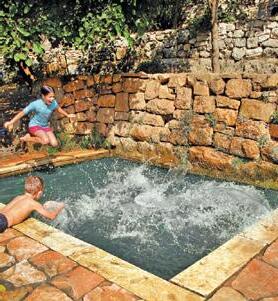
18 TORAH TIDBITS 1528 / RE'EH summer
Gush Etzion Tourism Ø˙ÈÏ‚‡ ˙¯ÈÈ˙ ÔÂÈˆÚ ˘Â‚ ‚ÂÏ A All the excitement. All nearby. Spectacular lookout points Heritage sites Cool springs Attractions and extreme activities Bike and hiking trails For all the attractions and activities search "Gush Etzion Tourism" or call for more information: 02-9933863 Ein Sejama - One of the dozens of springs in Gush Etzion in
Gush Etzion
בוט יכ 'הל ודוה
is reluctant to send Yishmael away and Yitzchak seeks reconciliation with Yishmael and seeks to bless Esav.

1UniTravel - Medical Insurance at great prices Choose from multiple options

1unitravel.brokersnexus.com

1UniSim - Sims for USA and Worldwide Starting at $40 sales@1unisim.com Call 077-400-3199 or USA 718-715-0001
6th Aliya (25:1-11) Avraham marries Keturah; they have 6 sons. All that Avraham has goes to Yitzchak; these are sent eastward with gifts. Avraham dies at age 175; he is buried by Yitzchak and Yishmael in Ma’arat Hamachpelah. Yitzchak is blessed by G-d: he lives in Beer L’chai Roi. The transition from Avraham to Yitzchak is complete. While G-d has been a silent partner in this parsha, here He completes the generational transfer – He blesses Yitzchak. The Jewish people will -
tions of Yishmael are enumerated. Yishmael dies. Hisous and powerful offspring. The brevity
is to emphasize that the Torah is not as interested in the history of power as in the history of the covenant of G-d with the Jewish people. And that will be told at great
HAFTORAH CHAYEI SARAH
Your Jewelry is Worth Gold!

The theme of this week’s haftorah echoes the theme in our parsha which mentions both the death of Sarah and Avraham. King David was an older man and a woman was assigned to him to serve him and provide warmth.
Adoniyahu, one of King David’s sons, began to prepare for ascension to his father’s throne. This was despite the fact that King David expressed his wishes that his son Shlomo succeed him.
Adoniyahu convinces two very significant personalities - the High Priest and the commander of King David’s armies - to
BY RABBI CHANOCH YERES av, Beit Knesset Beit Yisrael, Yemin Moshe

When Avraham addresses the people of Cheit, trying to acquire a burial spot for his wife, he says “Ger V’Toshav Anochi Eimachem” (23:4) “A Stranger and a Resident am I with you”
This seems to be a contradiction. If one is a stranger than he is not a resident, if he is a resident than he
The Magid of Dubno (Jacob ben Wolf Kranz 1741-1804) explains that Avraham watched how he spoke in this tense situation in order to, both, state his truth and be able to keep the peace -Shalom Bayit. Avraham said, on the one hand, “I am a Resident’ due to G-d’s promise to receive this Land and on the other hand, I still need your agreement to purchase a plot. In other words, Avraham implied “I am the resident” and you are the “strangers”, while they understood him as saying that “they” are the residents and Avraham is the stranger. The peace was kept, and Avraham remained true to his ideals.
OU ISRAEL CENTER 19 12 TORAH TIDBITS 1440 / CHAYEI SARA 5782
@Fancycolors vmkdiamonds.com vmk_diamonds Jewelry Manufacturer Upgrade your old Jewelry piece to a new modern design Best rate for broken and old gold pieces, inheritances Service in Hebrew | English | French | Italian Safe & Convenient Member of the Israel Diamond Exchange & the World Federation since 1997 Pay Cash
Mishael
054-397-7707
Vardi
Flying Soon? Travel with Confidence
THE PERSON IN THE PARSHA
BY RABBI DR. TZVI HERSH WEINREB OU Executive Vice President, Emeritus


“The Thief of Blessing”
I am sure that you, dear reader, have had the occasion to come across a book which you simply could not put down. Something so fascinating, so gripping, that you were compelled to read it cover to cover in as short a time as you could manage.
I came across such a book—a Hebrew book, the biography of a rabbi named Dov Cohen. Rabbi Cohen passed away at the advanced age of 94. He was one of the last, if not the last, of the students of the yeshiva in Hebron that experienced the horrible massacre there in the summer of 1929.
The book is entitled Vayelchu Shnayhem Yachdav ( And the Two of Them Walked Together). Much of Rabbi Cohen's story is encapsulated in that title. For, you see, he was born in Seattle, WA into a family of Lithuanian Jewish immigrants. The family faced all of the challenges of Americanization in the early decades of the last century.
Rabbi Cohen's mother witnessed the inexorable process of assimilation with which her older children were involved. She was determined that her youngest child, Dov, would receive a Jewish education as intensive as the one she witnessed back in the old country.
So, in 1926, she took her then
fourteen-year-old son from Seattle eastward across the United States, across the Atlantic Ocean, through the straits of Gibraltar, and ultimately to the then totally primitive and isolated village of Hebron. She committed him there to the tutelage of the famed Rabbi Nosson Tzvi Finkel of Slobodka. Indeed, “the two of them walked together.”
I cannot possibly share with you, in the context of this column, all of the ensuing adventures in Rabbi Cohen's life. But there is one episode that I must relate.
Dov visited the United States several times during the eighty years that followed his first days in the land of Israel. And each time he experienced a sort of "culture shock."
Once, on a Sunday morning, he found himself in a taxi with the radio on. He soon realized that the radio was playing a sermon being delivered by a Christian minister in his church. He was unable to have the taxi driver change the radio station. And so, quite uncomfortably, he listened to the preacher's sermon. And this is what he heard:
“The group in charge of increasing the enrollment in gehenna, or hell, was
20 TORAH TIDBITS 1528 / RE'EH
discussing ways to get more people to sin. One suggested encouraging them to steal. But the others all protested that the laws against theft were too strict and not enough people would sin by stealing. Another suggested encouraging people to lie. Again, the others protested that lying would make people feel too guilty. Finally came the suggestion with which everyone agreed:
“‘Let's encourage people to do good deeds, acts of loving kindness, acts of charity, acts of courage and justice. But let's tell them not to do those things today. But rather, tomorrow!’”
Rabbi Cohen was moved to the core by that story and was inspired by it. Indeed, he shared it with Jewish audiences whenever he could. The lesson he learned and shared was one that Judaism also teaches, albeit not with that particular story. It is the lesson of the dangers of procrastination, of the importance of doing things as soon as possible and not putting them off for tomorrow.
This lesson is conveyed in the opening verse of this week's Torah portion, Parshat Re'eh. “See, I set before you today blessing and curse.” Homiletically, the stress is upon “today,” this day and this moment. Do the right thing today and it will be a blessing. Put it off until tomorrow and the result is cursed.
We have all heard the advice, “Never put off until tomorrow what you can do today.” This advice is useful in all aspects of life, but it is especially useful in the context of religious behavior and spiritual service. Postponing until a tomorrow which may never come can be, as the Gentile
preacher’s story suggests, nothing less than sinful.
You may also have heard the adage, which originates with the 18th century poet Edward Young, “Procrastination is the thief of time.” The opening words of the Torah portion suggest that procrastination is not only the thief of time but it is the thief of life and of blessing.
“See, I have given you today, this day, now and not later, to perform the good deed, and if you do it now it will be a blessing. If you procrastinate you may never do it at all, and the result may be quite different from a blessing.” This is the lesson of the opening verse of Re’eh. And how ironic it is that the subject of the engrossing biography that I just finished reading, Rabbi Dov Cohen, a yeshiva boy and eventually a well-known Jewish rabbi, learned this lesson from a Protestant preacher on a Sunday morning long ago!

OU ISRAEL CENTER 21
Beating the banks every time



22 TORAH TIDBITS 1528 / RE'EH
OU ISRAEL CENTER 23
COVENANT & CONVERSATION
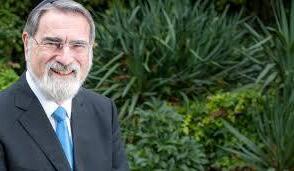
The Deep Power of Joy
On 14 October 1663, the famous diarist Samuel Pepys paid a visit to the Spanish and Portuguese Synagogue in Creechurch Lane in the city of London. Jews had been exiled from England in 1290 but in 1656, following an intercession by Rabbi Menasseh ben Israel of Amsterdam, Oliver Cromwell concluded that there was in fact no legal barrier to Jews living there. So for the first time since the thirteenth century Jews were able to worship openly.
The first synagogue, the one Pepys visited, was simply a private house belonging to a successful Portuguese Jewish merchant, Antonio Fernandez Carvajal, that had been extended to house the congregation. Pepys had been in the synagogue once before, at the memorial service for Carvajal who died in 1659. That occasion had been sombre and decorous. What he saw on his second visit was something else altogether, a scene of celebration that left him scandalised. This is what he wrote in his diary:
…after dinner my wife and I, by Mr. Rawlinson’s conduct, to the Jewish Synagogue: where the men and boys in their vayles (i.e. tallitot), and the women behind a lattice out of sight; and some things stand up, which I believe is their Law, in a press (i.e. the Torah in the Aron) to which all coming in do bow; and at the putting on their vayles do say something, to which others that hear him do cry Amen, and the party do kiss his vayle. Their service all in a singing way, and in Hebrew. And anon their Laws that they take out of the press are carried by several men, four or five several burthens in all, and they do relieve one another; and whether it is that everyone desires to have the carrying of it, I cannot tell, thus they carried it round about the room while such a service is singing … But, Lord! to see the disorder, laughing, sporting, and no attention, but confusion in all their service, more like brutes than people knowing the true God, would make a man forswear ever seeing them more and indeed I never did see so much, or could have imagined there had been any religion in the whole world so absurdly performed as this.
Poor Pepys. No one told him that the day
24 TORAH TIDBITS 1528 / RE'EH
May the learning of these Divrei Torah be תמשנ יוליעל HaRav Ya'akov Zvi ben David Arieh zt"l
RABBI LORD JONATHAN SACKS ZT"L Former Chief Rabbi of the United Hebrew Congregations of the Commonwealth תומשנ יוליעל ה״ע רטרש קחצי תב הינעמו בייל הירא ןב לאירזעו ה״ע זייא דוד לארשי תב הדלוגו רשא בקעי ןב סחנפ
THOUGHTS ON THE WEEKLY PARSHA
he chose to come to the synagogue was Simchat Torah, nor had he ever seen in a house of worship anything like the exuberant joy of the day when we dance with the Torah scroll as if the world was a wedding and the book a bride, with the same abandon as King David when he brought the holy ark into Jerusalem.
Joy is not the first word that naturally comes to mind when we think of the severity of Judaism as a moral code or the tear-stained pages of Jewish history. As Jews we have degrees in misery, postgraduate qualifications in guilt, and gold-medal performances in wailing and lamentation. Someone once summed up the Jewish festivals in three sentences: “They tried to kill us. We survived. Let’s eat.” Yet in truth what shines through so many of the psalms is pure, radiant joy. And joy is one of the keywords of the book of Devarim. The root ‘s-m-ch’ (the root of the word simcha, joy) appears once each in Genesis, Exodus, Leviticus, and Numbers, but twelve times in Deuteronomy, seven of them in our parsha.
What Moses says again and again is that joy is what we should feel in the Land of Israel, the land given to us by God, the place to which the whole of Jewish life since the days of Abraham and Sarah has been a journey. The vast universe with its myriad galaxies and stars is God’s work of art, but within it planet earth, and within that the Land of Israel, and the sacred city of Jerusalem, is where He is closest, where His Presence lingers in the air, where the sky is the blue of heaven and the stones are a golden throne. There, said Moses, in “the place the Lord your God will choose …
•4 rooms apartment(now 3) •109 sqm
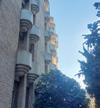
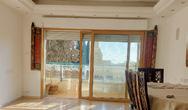
•Storage room •Shabbat Elevator
•Private Parking Spot •2 balconies
Lovely Bright & airy apartment, with lots of lights. Absolutely Prime location, near The Great Synagogue, Ben Yehuda St. & a walking distance to the Kotel. 2 balconies (1 full Sukkah), 2 full washroom, an extra service balcony.
- Price : 5,900,000 nis

OU ISRAEL CENTER 25
MICHAL NOAM +972-54-6108477
FOR SALE IN REHAVIA City Center near Yeshurun Synagogue
michalnre@gmail.com
to place His Name there for His dwelling” (Deut. 12:5), you will celebrate the love between a small and otherwise insignificant people and the God who, taking them as His own, lifted them to greatness.
It will be there, said Moses, that the entire tangled narrative of Jewish history would become lucid, where a whole people – “you, your sons and daughters, your male and female servants, and the Levites from your towns, who have no hereditary portion with you” – will sing together, worship together, and celebrate the festivals together, knowing that history is not about empire or conquest, nor society about hierarchy and power, that commoner and king, Israelite and Priest are all equal in the sight of God, all voices in His holy choir, all dancers in the circle at whose centre is the radiance of the Divine. This is what the
077-2050015
052-2678749
golanechasim@gmail.com
Meir Golan

covenant is about: the transformation of the human condition through what Wordsworth called “the deep power of joy.”1 Happiness (in Greek eudaemonia), Aristotle said, is the ultimate purpose of human existence. We desire many things, but usually as a means to something else. Only one thing is always desirable in itself and never for the sake of something else, namely happiness.2
RASCO: new 4 room apartment, 95m, master suite, elevator, balcony, very nice view 2,950,000 NIS
BAKA: 4 room apartment, 85m, elevator, neat & nice apartment. 2,850,000 NIS
ARNONA: 4-room apartment, 90m, beautifully renovated, master suite, balcony, storage, Shabbat elevator, private parking 3,250,000 NIS
ARNONA: 4-room apartment, 90m, master suite, balcony, storage, Shabbat elevator, private parking.
3,250,000 NIS
BAKA: New 4 room apartment in a new building, 88m, master suite, storage, Shabbat elevator, private parking, 3,950,000 NIS
BAKA: New 4 room apartment in a new building, 88m, master suite, storage, Shabbat elevator, private parking. 3,900,000 NIS
RECHAVIA: 4-room apartment, 92m, Suka balcony, Shabbat elevator, fully accessible, private parking, storage 4,400,000 NIS
ARNONA: 5-room apartment, 108m, balcony, nice view, Shabbat elevator, fully accessible, private parking, storage. 4,000,000 NIS
ARNONA: 5-room apartment, 120m, balcony, elevator, fully accessible, private parking, storage 4,350,000 NIS
RASKO: New 4-room penthouse apartment, 115m, beautiful terraces for a lovely panoramic view, elevator. 4,250,000 NIS
There is such a sentiment in Judaism. The biblical word for happiness, ashrei, is the first word of the book of Psalms and a key word of our daily prayers. But far more often, Tanach speaks about simchah, joy – and they are different things. Happiness is something you can feel alone, but joy, in Tanach, is something you share with others. For the first year of marriage, rules Deuteronomy (24:5) a husband must “stay at home and bring joy to the wife he has married.” Bringing first-fruits to the Temple, “You and the Levite and the stranger living among you shall rejoice in all the good things the Lord your God has given to you and your household” (Deut. 26:11). In one of the most extraordinary lines in the Torah, Moses says that curses will befall the nation not because they served idols or abandoned God but “because you did not serve the Lord your God with joy and gladness out of the abundance of all things” (Deut. 28:47). A failure to rejoice is the first sign of decadence and decay.
BAKA: 5-room garden apartment, 140m, master suite private parking, storage, full of light, nice garden, 6,000,000 NIS
TALBIYA: 4-room apartment, 95m, sukkah balcony, 2nd floor. 5,200,000 NIS

There are other differences. Happiness
OLD KATAMON: Spacious new 5-room apartment, 140m, terrace, underfloor heating, Shabbat elevator, 2 parking, 6,300,000 NIS
OLD KATAMON: 5-room apartment, 127m, master suite, balcony, private parking, storage, full of light. 5,500,000 NIS
FOR RENT:BAKA: nice 4-room apartment, 82m, beautifully renovated, master suite, air conditioners, balcony, second floor, elevator - fully accessible, storage, 8,000 NIS
OLD KATAMON: Spacious new 5-room apartment in a new project, 140m, terrace, underfloor heating, Shabat elevator, 2 parking. 6,300,000 NIS
Banks of the Wye during a Tour. July 13, 1798.”
2. Aristotle, Nicomachean Ethics, 1097a 30-34.
26 TORAH TIDBITS 1528 / RE'EH
1. William Wordsworth, “Lines Composed a Few Miles above Tintern Abbey, On Revisiting the
Meir Golan Old Katamon: 4-room apartment in a small and quiet street, 101 sqm, renovated, very bright and airy, master bedroom, Safe room (mamad), sukkah balcony, view, elevator, 3,400,000 NIS Old Katamon: 4-room apartment, 90 sqm, well split,
airy, sukkah balcony facing a magnificent panoramic view, 3 exp Shabbat
NIS
Katamon:
apartment
a very quiet
75
sukkah balcony
a green and pastoral view, 3 exp. Shabbat
storeroom,
NIS
bright,
elevator, parking, 3,290,000
Old
Spacious 3-room
in
street,
sqm,
facing
elevator, private parking
2,690,000
is about a lifetime but joy lives in the moment. Happiness tends to be a cool emotion, but joy makes you want to dance and sing. It’s hard to feel happy in the midst of uncertainty. But you can still feel joy. King David in the Psalms spoke of danger, fear, dejection, sometimes even despair, but his songs usually end in the major key:
For His anger lasts only a moment, but His favour lasts a lifetime; weeping may stay for the night, but rejoicing comes in the morning… You turned my wailing into dancing; You removed my sackcloth and clothed me with joy, that my heart may sing Your praises and not be silent. Lord my God, I will praise You forever.
(Psalm 30:6-13)
In Judaism joy is the supreme religious emotion. Here we are, in a world filled with beauty. Every breath we breathe is the spirit of God within us. Around us is the love that moves the sun and all the stars. We are here because someone wanted us to be. The soul that celebrates, sings.
And yes, life is full of grief and disappointments, problems and pains, but beneath it all is the wonder that we are here, in a universe filled with beauty, among people each of whom carries within them a trace of the face of God. Robert Louis Stevenson rightly said: “Find out where joy resides and give it a voice far beyond singing. For to miss the joy is to miss all.”3
In Judaism, faith is not a rival to science, an attempt to explain the universe. It’s a sense of wonder, born in a feeling of
gratitude. Judaism is about taking life in both hands and making a blessing over it. It is as if God had said to us: I made all this for you. This is My gift. Enjoy it and help others to enjoy it also. Wherever you can, heal some of the pain that people inflict on one another, or the thousand natural shocks that flesh is heir to. Because pain, sadness, fear, anger, envy, resentment, these are things that cloud your vision and separate you from others and from Me.
Kierkegaard once wrote: “It takes moral courage to grieve. It takes religious courage to rejoice.”4 I believe that with all my heart. So I am moved by the way Jews, who know what it is to walk through the valley of the shadow of death, still see joy as the supreme religious emotion. Every
www.angelrealty.co.il
For Sale in Efrat

Zayit: * 300 meter cott age, Pitum Haketoret St. 4,990,000 NIS
*The Village – 8 room cottage, 4,700,000 NIS
Dagan: * 4 room garden apt. 100m, 2,590,000 NIS
* Duplex with amazing garden – 6 rooms. 3.65 million
Tamar: * Semi attached home - 8 rooms. 4.5 million
Gefen: * 3 room apt. Option to add on a full floor. 1,690,000 NIS
For Sale in Ramot B
7 room, stunning semi attached home. Great gard en. 6.5 million
Gabi- 0524588716
OU ISRAEL CENTER 27
3. Robert Louis Stevenson, “The LanternBearers,” in The Lantern-Bearers and Other Essays (New York: Cooper Square Press, 1999).
4. Søren Kierkegaard, Journals and Papers, 2179.
day we begin our morning prayers with a litany of thanks, that we are here, with a world to live in, family and friends to love and be loved by, about to start a day full of possibilities, in which, by acts of loving kindness, we allow God’s Presence to flow through us into the lives of others. Joy helps heal some of the wounds of our injured, troubled world.
These weekly teachings from Rabbi Sacks zt”l are part of his ‘Covenant & Conversation’ series on the weekly Torah teaching. With thanks to the Schimmel Family for their generous sponsorship, dedicated in loving memory of Harry (Chaim) Schimmel. Visit www.RabbiSacks.org for more.
BAKA / MEKOR HAIM – 4 rooms, 90m, 2nd floor + elevator, renovated by architect, fireplace, a/c, very central, close to all amenities
In the heart of calm and pastoral BAKAPrivate arab house, 6 rooms, 500m + possibility of building 250m, huge garden, approx. 700m, completely renovated, underfloor heating + a/c, large parking, 5 bathrooms, 5 toilets, green
3050000 NIS MENDEL 052-8980111
MENDEL 0528980111


TALBIEH – 95m, elevator, very well kept, bright, in the corner of building, 3 orientations, accessible
3100000 NIS MENDEL 052-3202488













BAKA - New penthouse, 4 rooms in a small luxurious building with character, alone upstairs, 3rd floor + elevator, 4 orientations, 3 toilets, 2 bathrooms, terrace / sukkah, 70m, parking, store-room

5450000 NIS MENDEL 052-8980111
ADAM ST. CLOSE TO ARNONA HATZEIRAin a step building, very spacious, 5 rooms + terrace, 40m, open view, renovated, private entrance, quiet, potential of adding extra unit.
3290000 NIS MICHAEL 052-3202488
MOSHAVA / In a building after TAMA 38, new apartment, 4 rooms, 3rd floor + elevator, balcony/partial sukah, opened sight, 2 bathrooms, calm, parking
MENDEL 052-8980111
In a small and pastoral street in the heart of BAKA - Penthouse/Duplex, 5 rooms, terraces, 15m + balcony, 6m, 2nd & 3rd floor + elevator, 3 orientations, parking
MICHAEL 052-3202488
BAKA / MEKOR HAIM - 4 rooms, 90m, 2nd floor + elevator, completely renovated, fireplace, a/c, gas heating, very central, close to all amenities
MENDEL 052-8980111
Near Arnona Hatzaira, in a step building, very large 5-room apartment + balcony/sukkah, 40m, renovated, 3rd floor, private entrance, quiet, potential for extra independent unit
MICHAEL 052-3202488
THE ISRAELB ONLINE COMMUNITY


































































































ARNONA – 3 rooms, that will be transformed to 90m, 3rd floor with elevator, store-room, parking
Connecting you with fellow Jews, Israel & the Jewish People!
ONLY 2550000 NIS
MICHAEL 052-3202488
n Install the new ISRAELB APP from the google play store to your phones (Dedicated in memory of Elchanan Yosef ben Chaim Eliezer)












n Advertise on our new ISRAELB BUSINESS CENTER to gain exposure for your business






n We can help you WRITE SPEECHES AND DIVREI TORAH for family events & Smachot


In the pastoral BAKA - quiet and central, stunning villa 350m, in a magical atmosphere, designed, pool, 4 bedrooms, cinema room and more, 4 bathrooms, garden, parking
n Use IsraelB to ORGANIZE, PROMOTE AND PUBLICIZE your events and Smachot






MIKAEL 052-3202488















n Use IsraelB to help you SELL OR RENT OUT YOUR PROPERTY
IsraelB is your resource for jobs, events, community news, shiurim and much more!






















































Subscribe to our IsraelB newsletter, follow us on Twitter (@IsraelBayit) and join our Facebook Page & Groups. (Links on IsraelB.org)
ARNONA HATZEIRA - Very spacious penthouse, 120m, 4th floor + elevator, huge terrace / succah, 75m, open view, 2 parking spaces, cellar, 3 toilets, quiet, completely renovated, immediate entrance
CONTACT BENJY SINGER: benjysinger@israelb.org or 053-285-1526
MICHAEL 052- 3202488
28 TORAH TIDBITS 1528 / RE'EH
Dental Implants
Dr. Gedaliah Mordechai Stern
Diplomate of Oral Implantology
Faster, Easier and Better than ever before.
Come and get a second opinion, if you were told you need:
Bone grafts or sinus lifts Cutting and stitching Months without teeth
Not enough bone (These can usually be avoided today)
Almost always with less pain and less swelling, thanks to Lasers and Advanced Technologies. No-cost consult. No-cost x-rays (2D/3D) if have already, within last 6 months.




STATE-OF-THE-ART
In An
Teeth
Hour
implantsandlasers-r-us.com Ussishkin 57, Rechavia, Jerusalem 02-6258258

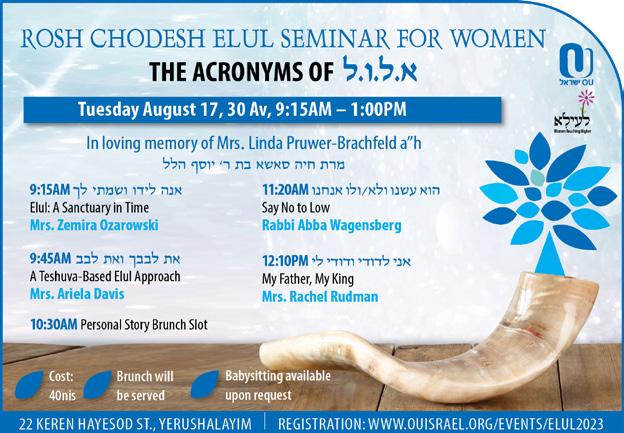
30 TORAH TIDBITS 1528 / RE'EH
המלש האופר
הניאר
תב הרוא המלש האופר
Yosef Ezriel ben Chaya Michal
PLEASE NOTE TORAH TIDBITS ADVERTSING DEADLINES THROUGH SUKKOT
Shabbat, Aug. 18-19
» Sunday, Aug. 13th
Shabbat, Aug. 25-26
» Thursday, Aug. 17th
Shabbat, Sep. 1-2
» Sunday, Aug. 27th
Shabbat, Sep. 8-9
» Sunday, Sep. 3rd
Rosh Hashana, Sep. 15-16
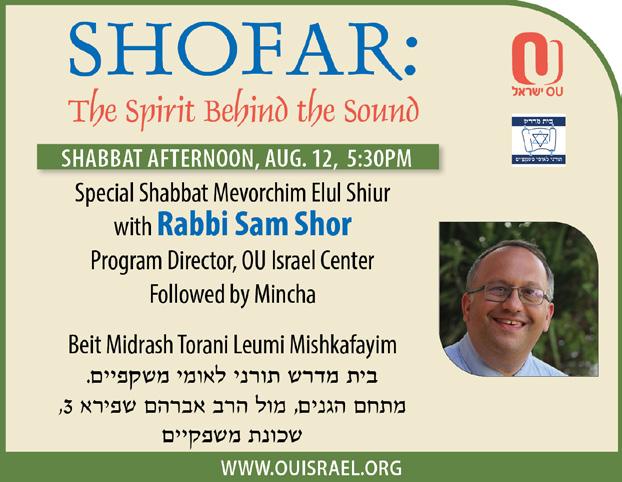
» Thursday, Sep. 7th
Shabbat/Yom KippurSukkot, Sep. 22-23
» Thursday, Sep. 14
Call Ita Rochel: 02-5609125 or ttads@ouisrael.org
Chana bat Bruriah
Feyge Sara bas Chaya Peshe
Nechama Charna bat Feigel
Leah Naomi bat Tova
אנדהאב לרפ ןב עשוהי םהרבא
הגלוא ןב קיזייא בל
הלחמ ןב ןתנוהי
OU ISRAEL CENTER 31
GET FIT WHILE YOU SIT: Exercise for ladies Sundays 12:45-1:30pm at the OU Israel Center Sura Faecher 0504153239
Resumes Aug. 21st
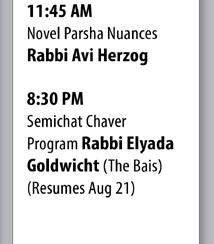

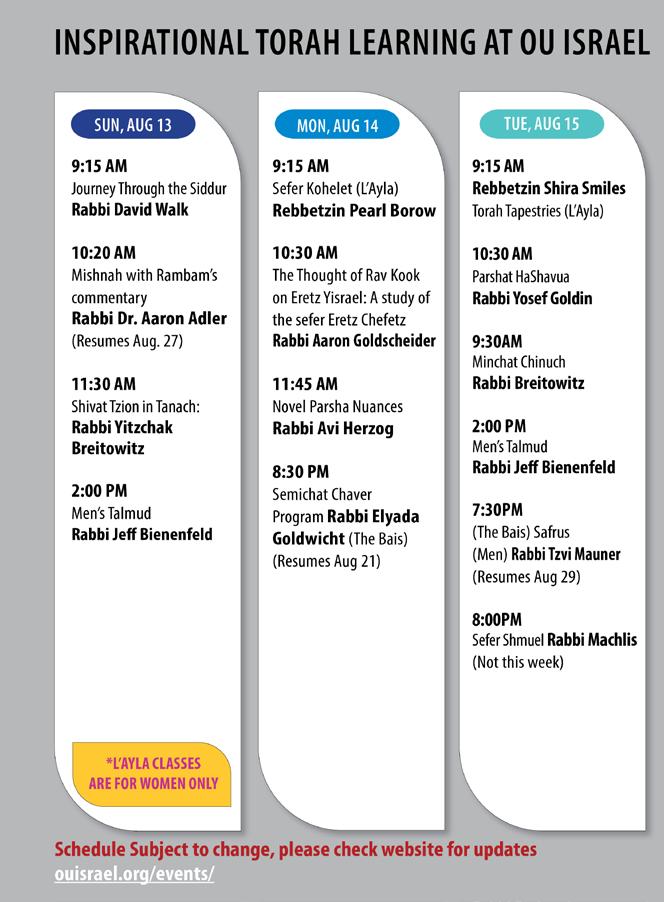
32 TORAH TIDBITS 1528 / RE'EH
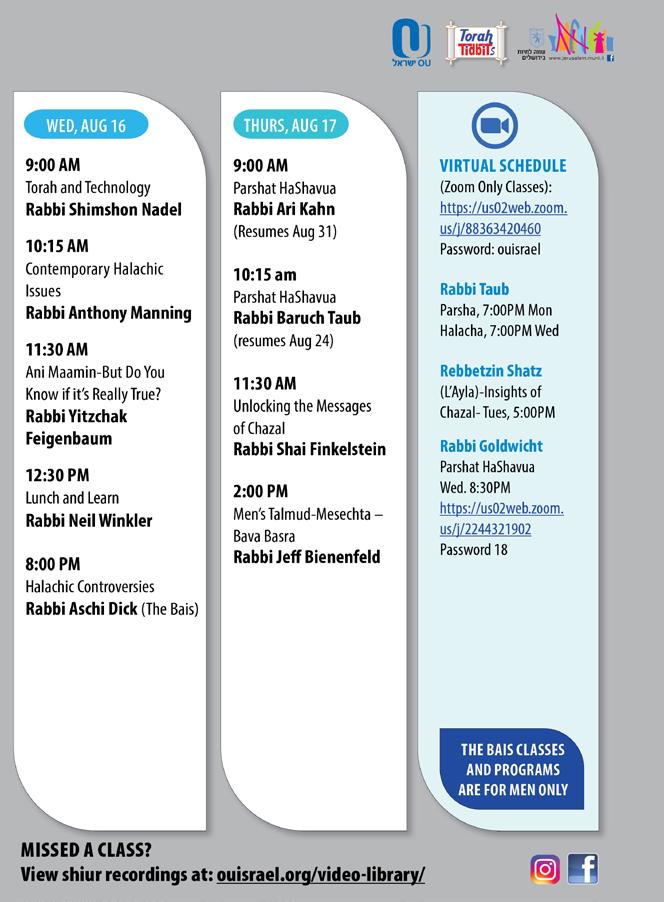
OU ISRAEL CENTER 33
B'CHODSHO BY RABBI SHMUEL GOLDIN Faculty, OU Israel Rabbi Emeritus, Congregation Ahavath Torah, Englewood NJ
B'CHODSHO
BY RABBI SHMUEL GOLDIN Faculty, OU Israel Rabbi Emeritus, Congregation Ahavath Torah, Englewood NJ
BY RABBI SHMUEL GOLDIN Faculty, OU Israel Rabbi Emeritus, Congregation Ahavath Torah, Englewood NJ



Is This Any Way to Introduce a Hero?
Is This Any Way to Introduce a Hero?
Sounds of the Soul
Context:
Is This Any Way to Introduce a Hero?
During the month of Ellul, following the Shacharit service, the familiar blasts are sounded: Tekia (a long unbroken Shofar sound), Terua (nine staccato blasts), Shevarim (three medium-length sounds).
With the month of Nissan upon us, we return to the story of our nation’s birth, as Moshe rises to leadership and the exodus again unfolds.
Parsha that follows (why the information is given at that particular point is the subject of another article).
Parsha that follows (why the information is given at that particular point is the subject of another article).
Parsha that follows (why the information is given at that particular point is the subject of another article).
the biblically-ordained chatzotzrot , silver trumpets.
If the information concerning Moshe’s lineage is eventually shared, why is it left out in the first place?
If the information concerning Moshe’s lineage is eventually shared, why is it left out in the first place?
C. The scene confronting us could not be more significant…
If the information concerning Moshe’s lineage is eventually shared, why is it left out in the first place?
Numerous commentaries address the issues before us…
Numerous commentaries address the issues before us…
Numerous commentaries address the issues before us…
With the Exodus and Revelation behind them, the nation’s encampment at Mount Sinai is now about to end. All is in place. A divinely chosen nation has been formed. That nation’s journey is about to begin.
With the month of Nissan upon us, we return to the story of our nation’s birth, as Moshe rises to leadership and the exodus again unfolds.
With the month of Nissan upon us, we return to the story of our nation’s birth, as Moshe rises to leadership and the exodus again unfolds.
Questions:
Moshe’s yearly introduction in the text, however, is cause for pause. For some reason, the Torah chooses to introduce the birth of the greatest leader we have ever knownin the most innocuous way possible.
What is the significance and origin of each Shofar sound?
Moshe’s yearly introduction in the text, however, is cause for pause. For some reason, the Torah chooses to introduce the birth of the greatest leader we have ever knownin the most innocuous way possible.
Is there a biblical source for the specific blasts of the Shofar?
A. The Shofar emerges as a powerful symbol early in Jewish history…
Moshe’s yearly introduction in the text, however, is cause for pause. For some reason, the Torah chooses to introduce the birth of the greatest leader we have ever knownin the most innocuous way possible.
“And a man went from the House of Levi and he took a daughter of Levi. And the woman conceived and gave birth to a son.”
“And a man went from the House of Levi and he took a daughter of Levi. And the woman conceived and gave birth to a son.”
Working within the realm of pshat, the Ibn Ezra suggests that, at the time of Moshe’s birth, the Israelites lived in many cities in Egypt. Through the phrase, “And a man went,” the Torah is simply informing us that Amram “went” from one Egyptian city to another in order to marry Yocheved.
Working within the realm of pshat, the Ibn Ezra suggests that, at the time of Moshe’s birth, the Israelites lived in many cities in Egypt. Through the phrase, “And a man went,” the Torah is simply informing us that Amram “went” from one Egyptian city to another in order to marry Yocheved.
Working within the realm of pshat, the Ibn Ezra suggests that, at the time of Moshe’s birth, the Israelites lived in many cities in Egypt. Through the phrase, “And a man went,” the Torah is simply informing us that Amram “went” from one Egyptian city to another in order to marry Yocheved.
But, God has yet one more commandment to deliver… His final instructions before the nation takes its first steps away from Sinai:
“And a man went from the House of Levi and he took a daughter of Levi. And the woman conceived and gave birth to a son.”
Questions abound:
Questions abound:
Why does the Torah depart from its usual mode of describing an individual’s birth?
Perhaps the Ibn Ezra intends to emphasize that Yosef’s plan for his family’s descent into Egypt has, by this point, broken down. Originally meant to remain separate from the Egyptians in the land of Goshen, the Israelites are assimilating into their surroundings.
Why does the Torah depart from its usual mode of describing an individual’s birth?
Questions abound:
Why does the Torah depart from its usual mode of describing an individual’s birth?
While Rabbinic tradition traces the Shofar’s origin to the ram offered by Avraham on Mount Moriah, following the binding of Yitzchak; the Torah’s first clear reference to the Shofar emerges from the site of another mountain, Mount Sinai.
What does the seemingly superfluous phrase “and a man went…” indicate?
What does the seemingly superfluous phrase “and a man went…” indicate?
What does the seemingly superfluous phrase “and a man went…” indicate?
Why does the Torah omit any mention of Moshe’s lineage- to the point where even the names of his parents are deliberately omitted?
Why does the Torah omit any mention of Moshe’s lineage- to the point where even the names of his parents are deliberately omitted?
There, during the moments of God’s closest contact with man, Revelation is accompanied by Shofar blasts of increasing intensity
Why does the Torah omit any mention of Moshe’s lineage- to the point where even the names of his parents are deliberately omitted?
Above all, is this any way to introduce a hero?
Above all, is this any way to introduce a hero?
Above all, is this any way to introduce a hero?
Compounding these questions is the fact that the omitted information concerning Moshe’s lineage is ultimately included in the
Compounding these questions is the fact that the omitted information concerning Moshe’s lineage is ultimately included in the
Compounding these questions is the fact that the omitted information concerning Moshe’s lineage is ultimately included in the
B. In order to understand the origin and meaning of the specific Shofar blasts, however, we must travel back to another point, a bit later in our national history. There, we encounter sounds emerging from an entirely different source:
Perhaps the Ibn Ezra intends to emphasize that Yosef’s plan for his family’s descent into Egypt has, by this point, broken down. Originally meant to remain separate from the Egyptians in the land of Goshen, the Israelites are assimilating into their surroundings.
“Make for yourself two Chatzrotzrot Kessef , Trumpets of Silver; of beaten work shall you make them; and they shall be for you for the summoning of the Assembly and to cause the camps to journey.”
Perhaps the Ibn Ezra intends to emphasize that Yosef’s plan for his family’s descent into Egypt has, by this point, broken down. Originally meant to remain separate from the Egyptians in the land of Goshen, the Israelites are assimilating into their surroundings.
The Ramban, however, takes issue with the Ibn Ezra’s interpretation, arguing that the Torah would have no reason to inform us concerning a journey taken by Amram from one city to another.
The Ramban, however, takes issue with the Ibn Ezra’s interpretation, arguing that the Torah would have no reason to inform us concerning a journey taken by Amram from one city to another.
D. As first introduced, the Trumpets seem solely utilitarian in character; to be used for such practical tasks as mustering the people and announcing travels.
The Ramban, however, takes issue with the Ibn Ezra’s interpretation, arguing that the Torah would have no reason to inform us concerning a journey taken by Amram from one city to another.
A further reading of the text reveals, however, that there is much more to the Chatzotzrot than first meets the eye:
Instead, maintains the Ramban, the verb lalachet, “to go,” is often used in the text when a new and difficult step is about to be taken. By stating, Veyeilech ish, “And a man went,” the Torah underscores Amram’s courageous willingness to marry in spite of Pharaoh’s harsh decrees.
Instead, maintains the Ramban, the verb lalachet, “to go,” is often used in the text when a new and difficult step is about to be taken. By stating, Veyeilech ish, “And a man went,” the Torah underscores Amram’s courageous willingness to marry in spite of Pharaoh’s harsh decrees.
Instead, maintains the Ramban, the verb lalachet, “to go,” is often used in the text when a new and difficult step is about to be taken. By stating, Veyeilech ish, “And a man went,” the Torah underscores Amram’s courageous willingness to marry in spite of Pharaoh’s harsh decrees.
The Ramban’s approach connects to a
The Ramban’s approach connects to a
The Ramban’s approach connects to a
"And when you go to wage war in your land against the adversary that oppresses you, then you shall sound an alarm with the Trumpets, and you shall be recalled before the Lord, your God, and you shall be saved from your foes.
34 TORAH TIDBITS 1528 / RE'EH 16 TORAH TIDBITS 1509 / VAYAKHEL - PEKUDEI 5783
B'CHODSHO
MIDEI CHODESH 16 TORAH TIDBITS 1509 / VAYAKHEL - PEKUDEI 5783
MIDEI CHODESH 16 TORAH TIDBITS 1509 / VAYAKHEL - PEKUDEI 5783
MIDEI CHODESH
And on the day of your gladness, and on your festivals, and on your new moons, you shall sound the Trumpets over your burnt offerings and over your feast peace offerings; and they shall be a remembrance for you before your God; I am the Lord, your God."
E. The sounding of the Trumpets described in these passages is far from ordinary…
Here, the Chatzotzrot are apparently to be used to communicate with God; their sounding a form of wordless prayer, designed to pierce the heavens.
F. As our understanding of the broader role of the Chatzotzrot expands, a fascinating pattern begins to emerge.
The Torah identifies two distinct blasts to be sounded by the Chatzotzrot:
1. The Tekia- A long unbroken sounding of the Trumpet; associated in the text with congregational assembly, leadership assembly and communal celebration.
2. The Terua-A broken sounding of the Trumpet; associated with a call to travel and the advent of war.
Apparently, even the initially mentioned usage of the Trumpets is not solely utilitarian. The sounds of the Chatzotzrot consistently mirror the mindset of the people at the moment of their sounding.
Times of comfort and stability; such as occasions of assembly and celebration; are marked by a Tekia-an unbroken, sound of certainty. Times of instability, challenge, and distress, on the other hand; such as occasions of journey and war; are associated primarily with the Terua-a broken, uncertain sound.
At our departure from Sinai, the first clear sounding of two types of blasts that are ultimately connected to the sounding of the
Shofar: the Tekia and the Terua.
G. Tellingly, however, although both the Tekia and the Terua are sounded on the days leading to, and on, Rosh Hashana; only the latter, broken sound is clearly connected to the festival in the Torah text. So central, in fact, is the association between the broken sound of the Shofar and Rosh Hashanah that that the Torah refers to this holy day as Yom Terua, “a day of Terua,” and Zichron Terua , “a remembrance of Terua .” The message is clear. The aura of Rosh Hashana, the yearly Day of Judgment, is captured by the Terua, the broken, uncertain sound of the Shofar.
H. While the Terua is defined as a broken sound, however, its exact nature becomes the subject of discussion and debate. Three distinct traditions emerge over time, all reflective of the uncertain character of the Terua sound.
Some maintain that the Terua is meant to mirror an individual in the act of sobbing. This opinion is fulfilled through the sounding of the blasts that we refer to as the Terua; nine, quick, staccato sounds. Others maintain that the sound is meant to reflect an individual in the act of sighing, a mandate fulfilled through the series of blasts that we refer to as the Shevarim, three medium-length sounds. Yet a third position combines the two, resulting in a Shevarim-Terua, representing an individual whose sighing leads to sobbing. 1 The Talmud relates that Rabbi Avahu decreed the sounding of all possibilities, thus creating the universal
1. Talmud Bavli Rosh Hashana 33b; Notably, the rabbis do not suggest the sounding of a Terua-Shevarim. They maintain that sighing leads to sobbing, while sobbing does not lead to sighing.
OU ISRAEL CENTER 35
practice that continues to this day.2
Just as the notes of the Chatzotzrot mirror the internal state of the Israelites at the time of the Trumpets’ sounding, so, too, the blasts of the Shofar reflect the internal turmoil of each individual standing on Rosh Hashana, in judgment before God.
I. The message emerging from this imagery, however, strikes even deeper. The Terua blasts of the Shofar, after all, are not meant to simply mirror an individual’s internal struggle.
These sounds are instead designed to awaken, cultivate, and develop that very struggle.
As the Rambam proclaims:
"Although the sounding of the Shofar on Rosh Hashanah is an unexplained edict of the text, a lesson is imbedded within it:
‘Awaken slumberers from your sleep… examine your ways … return to and remember your Creator… Look into your souls, examine your ways and actions, and let each one of you abandon his evil path…’"3
Sounded as the beginning of the year approaches, as our personal journeys begin again, the sounding of the Shofar is designed to arouse the one element essential to all religious striving: our own human spirit, our heart and our soul. That awakening accomplished, the Shofar sounds then reflect our spirit back to God in wordless, heartfelt prayer.
J. Circling back, our analysis of the Shofar blasts illuminates the true significance of the Chatzotzrot, as well.
Like the Shofar sounds, the blasts of the Trumpets were designed to awaken and
to reflect the one final component essential to the success of the Jewish journey, the indomitable human spirit lying in the heart of each Israelite.
As the people prepare to depart Sinai, God turns to Moshe and says:
I have given you all that I can. The laws, the symbols, the rituals and the legal process are all in place. Now, however, you must add the one ingredient that I cannot; the one essential element that must come from each of you, of your own free will: your own personal spirit.
Create for yourself Chatzotzrot…" sound them again and again… and let those trumpets awaken your spirit, in times of certainty or doubt, in times of celebration or conflict. Meet each of these vastly different circumstances with the same inner strength and devotion. Above all, remember that all that I have given you will be meaningless without the investment of your spirit and your soul…
And if you are successful, then the notes of those Trumpets will themselves be transformed into wordless prayer, piercing the vaults of the heavens and reaching My Heavenly Throne. For those sounds will represent your spirit and soul as no words can.4
4.
A final, easily missed, textual nuance
underscores
the symbolism of the Chatzotzrot
. Based on the phrase "Make for yourself two Trumpets of silver,” the rabbis determine thatalone among the sacred objects fashioned in Moshe’s day- the Chatzotzrot were “generation-specific.”
While all other utensils could be handed down across the years, the Trumpets could not. After Moshe’s death, Yehoshua’s generation would have to fashion their own, as would each generation that followed.
Representing the spirit unique to each generation, over and over again, the Chatzotzrot must be created anew.
36 TORAH TIDBITS 1528 / RE'EH
2. Talmud Bavli Ibid 34a
3. Rambam ibid Hilchot Teshuva 3:4
K. Two sets of wordless sounds…Trumpets heralding the onset of our nation’s journey… a ram’s horn heralding the beginning of the year.
Two sets of wordless sounds…both reflecting one critical component: the sanctified spark lying at the core of each soul; a spark that must be kindled again and again, are we to reach our full potential.
Rabbi Goldin is the author of the OU Press volumes "Unlocking the Torah Text," and "Unlocking the Haggada."
SHIUR SPONSORS
Rabbi Goldscheider’s Shiur has been sponsored for the 2023 Academic Year
ל’’ז המלש ןב בוט םשו ה’’ע םהרבא תב םירמ תמשנ וליעל
Rebbetzin Shira Smiles Shiur
is sponsored for the 2023 academic year by Dr. & Mrs. Menachem Marcus in memory of their parents, Rose & Dr. Emanuel Marcus z”l -
ל”ז סוקרמ השמ ןב יכדרמו ריאמ ףסוי תב לזייר Rosi and Ernest Strauss z”l -
ל”ז סוארטש דוד ןב לאינדו םהרבא תב דומיל
Rabbi Breitowitz’s Tuesday ShiurMinchat Chinuch

is sponsored for the academic year 2023 by Rabbi Refoel & Sharon Auman in memory of their parents Edith & Reiner Auman z”l
ד”יה לאפר תב ה”ע רתסאו ל”ז קודצ ןב הנוי and their son Rabbi Shmuel Eliyahu Auman z”l
י”נ לאפר ברה ןב ל”ז והילא לאומש ברה
Rabbi Goldin’s Shiur
is sponsored for the 2023 academic year by Dr. & Mrs. Menachem Marcus in memory of beloved aunts

Irma Haas a”h and Hilde Myer a”h
Rabbi Manning’s Shiur
has been sponsored for the 2023 academic year
ל’’ז ןמלק ןב גילזו ה’’ע תידנרב תב הנרב תמשנ יוליעל
Rabbi Taub’s Weekly Thursday
Parshat HaShavua Shiur
is sponsored by The Jewish Legacy Foundation
OU ISRAEL CENTER 37
number is 157,600. The total count of the army age men is 603,550 without the tribe of Levi.
PROBING THE PROPHETS
BY RABBI NACHMAN (NEIL) WINKLER Faculty, OU Israel Center

descendants of Levi, son of Yaakov. Their lineage, at quite some length, is given in the next aliya.
Rabbi Winkler's popular Jewish History lectures can be viewed by visiting the OU Israel Video archive: https://www.ouisrael.org/video-library
"המחונ אל הרעס הינע"
The people travel and camp with the Mishkan in their midst. Physically and metaphorically. We travel our history with G-d in our midst. While the distinct feeling you get in the detailed description of where each tribe encamped is the feeling of an army encampment, there is another layer of meaning. Yes, regimented. Specific. Detailed. Organized. But an army for which purpose? To fight the anticipated foes in the Land of Israel? Or to be the army of Hashem? A fighting army with its G-d in its midst? Or both?
This week’s haftarah is the third of the “Shev D’nechemta” and yet its very first phrase “O, you poor tempest-tossed, uncomforted one” indicates that Israel had not yet been comforted. After past haftaroth declaring Yishayahu’s messages of “Nachamu, Nachamu Ami” (Comfort My nation) and “Ki nicham Hashem Tziyon”, (Hashem has comforted Tziyon), we can rightly ask why the consoling words have not succeeded in bringing the much-needed solace to Israel. To discover the answer in this selection, one of the shortest of these haftarot (only twelve p’sukim), presented me with a challenging task.
So I believed …… until I was enlightened by the writings of Rav Shimshon Rapha’el Hirsch.
4th aliya (3:1-13) Aharon’s sons’ names were Nadav, Avihu, Elazar and Itamar. Nadav and Avihu died without children. Elazar and Itamar serve as Kohanim with Aharon. Take the Leviim: they are to serve Aharon. The Leviim are responsible for the Mishkan: to support the Kohanim and the people, to facilitate the running of the Mishkan. The Leviim shall take the place of the first-born, who became obligated to me when saved in Egypt.
There are 2 groups mentioned here: Kohanim and Leviim. The lineage of the Kohanim is given. It just doesn’t take much room. Because Aharon is a Kohen and his sons. But he only has 2. So the entire lineage of the Kohanim is 3 people. The Leviim, on the other hand, are an entire tribe,
Rav Hirsch focuses on this very first phrase and, with his explanation, opens worlds of understanding for us all. The words of the navi were not to be understood as a message to his generation alone but one addressed to the future sufferings of Hashem’s nation. For two-thousand years, writes Rav Hirsch in the mid-nineteenth century, we Jews have been “tempest-tossed. As he portrays it:
Every person who was not born in Israel and lives in the Holy Land should celebrate his/her ALIYANNIVERSARY annually!
REMEMBER! WITH ALIYAH BLESSINGS!
The NEAMANS
5th aliya (3:14-39) Count the tribe of Levi by households, from 1 month and older: the households of Gershon, Kehat and Merari, the sons of Levi. The sons of Gershon, Kehat and Merari are listed. Gershon’s family, from a month and above, is 7,500. They camp to the west of the Mishkan. Their task was to transport and be responsible for the curtains and coverings. Kehat numbered 8,600, camping to the south. They were responsible for the vessels: Aron, Menorah, Table, altars. Merari numbered 6,200, camping to the north. Responsible for the structure of the Mishkan; the walls, supports and beams. The total of the tribe of Levi is 22,000. On the front side, the east of the Mishkan, Moshe and Aharon and families camped.
Israel finds herself in the midst of states that, to all appearances, have established themselves firmly. Israel alone that is without any firm external hold, like a ship without an anchor that has no resistance to any wind: today driven by the force of the storm to the west and tomorrow to the east….[This is] the most descriptive characterization of the Jews throughout so many dark centuries…You came near to despairing altogether of your future…
As Jews across the globe and across the centuries read the prophet’s description of the nation’s condition, they well identified with their inability to be comforted by the prophetic words share with them. How, after all, could they feel any solace when they look at their condition in comparison to the rest of the world? If the Jews of 12th century Germany and 14th century Spain and 17th century Ukraine found themselves in that same condition – they would well identify with the Jews of Yishayahu’s era, they too would feel no comfort in these words!
The encampment around the Mishkan had 2 layers. The Leviim were in close, on 3 of the 4 sides of the Mishkan. The 4th side, the leading side, had Moshe and Aharon. The entire 12 tribes were farther removed on all 4 sides.
The 3 sons of Levi were family groups; Gershon, Kehat and Merari. They had full responsibility for the Mishkan. Their tasks fell in categories. Gershon; textiles. Kehat; furniture. Merari; building. Gershon took care of the curtains and coverings. Kehat, the important main vessels of the Mishkan. And Merari the structure of the building.
6th aliya (3:40-51) Count all the firstborn of the age of a month and above. The Leviim are to replace the firstborn. There were 273 more
And, understanding this, the navi tells his people (v. 14): “B’tzdaka tikonani” – you will be firmly established upon righteousness. For, though you perceive the surrounding nations, drunken with power and wealth, and you wonder how you might ever match their success or their supreme authority you must realize that such “achievements” will not guarantee your happiness or your survival.
38 TORAH TIDBITS 1528 / RE'EH
14 TORAH TIDBITS 1516 / BAMIDBAR
Friday, August 11 to Friday, August 18
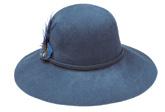

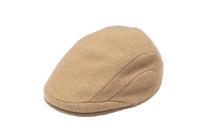
Hours: Sun-Thurs 10:00-20:00 Friday 10:00-15:00

No, that is not your challenge.
True, you might be blessed with power and material success but these will not bring you the happiness for which you strive. Your future will rest only upon your moral strength, “B’tzdaka tikonani”.
Rav Hirsch, however, sees yet another lesson in the words of our haftarah. Simply doing what is “right” is not sufficient, he explains. Together with that must come knowledge…the knowledge of what is truly “right” and what is actually “wrong”. And then, he adds a thought that, in my estima tion, speaks powerfully to us, who are chal lenged to do the right thing but, too often, are too confused to know what that is. Rav Hirsch writes:

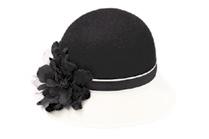
The ideas of men as to ‘good’ and ‘evil’ changes according to the times and the nations. There is only one everlasting
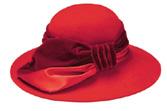

source of…..’good’ and ‘evil’ – and that is G-d!!


It is for this reason that Yishayahu promises that your children shall be “limudei Hashem” – “pupils of G-d” who will understand what right and wrong is, what good and evil is, and, by possessing that knowledge, will have the moral strength to build a lasting future based upon “B’tzdaka”, true righteousness.

OU ISRAEL CENTER 39
Dorot Rishonim 3, Jerusalem • Tel: 02 563-7155 • www.SherlockSHats.com ONCE A YEAR ON H AT S SUMMER FALL WINTER SPRING
30% sale
FREE SHIPPING IN ISRA EL 053-‐427-‐6363 CINEMA
CITY
MALL,
JERUSALEM ArthurMSamuels@gmail.com PODIATRIST Over
30
years
experience Arthur
Samuels,
DPM Licensed in Israel & America CINEMA CITY MALL, JERUSALEM
RABBI SHALOM ROSNER
Ensuring A “Safer”Torah

In Parshat Re’ah we are instructed for the second time in Sefer Devarim (previously in Va’etchanan), not to add or detract from the mitzvot:
The Rambam explains that just as a doctor at times has to amputate a limb to save a life, so too Hazal are authorized to “cut-off” a mitzva (like Shofar on Shabbat) in order to ensure proper observance of mitzvot in general. So that one will not carry on Shabbat, Hazal initiate a “shev v’al ta’ase” and restrict blowing shofar on Rosh Hashana that falls on Shabbat.
Everything I command you that you shall be careful to do it. You shall neither add to it, nor subtract from it. (Devarim 13:1)
Rashi offers an example – that one should not add a fifth parsha to the four parshiyot of tefillin. The Rambam (Hilchot Mamrim 2:4), asks how is it that Hazal at times add or limit mitzvot? Is there a clergy exemption? We are one of the only religions that demands of all individuals to fulfill commands, not just priests.
Since Hazal have permission to limit certain mitzvot, we have to be careful not to change a mitzva, like permitting eating milk and meat. Hazal may, however, restrict something as a Rabbinic decree so that the masses avoid engaging in a prohibited activity. For example, although one is Biblically permitted to eat chicken and milk, Hazal can prohibit it, so long as they make it clear that it is a Rabbinic decree.
הרותל גייס ושע
In fact, the very first Mishna in Pirke Avot lists three declarations that Anshe
While you're enjoying your summer vacation, you'll be happy to know that over 200 poor and needy families will be having chicken on Shabbat thanks to you!
Send your contributions to:
Clara Hammer Chicken Fund


P.O.B.18602 Jerusalem 91185 | Tel.02-5823477
Donate via PayPal at Chickenladyofjerusalem.com
Or pay Hacker's Butcher Shop Directly via credit card
Tel. 02-5819378
40 TORAH TIDBITS 1528 / RE'EH
ֹותֹא םכתא הוצמ יכֹנא רׁש א רבדה־לכ תא :ונממ ערגת אֹלו וילע ףסֹת־אֹל תֹוׂשעל ורמׁש ת )א:גי םירבד(
Rav Kehilla, Nofei HaShemesh Maggid Shiur, Daf Yomi, OU.org Senior Ra"M, Kerem B'Yavneh
The daughter and granddaughters of Mrs. Chana (Hammer) Homnick a"h are continuing to run The Chicken Fund in their grandmothers' memory.
K’nesset Ha’Gedola initiated to protect religious observance in exile. They knew that this was the last generation of prophets and that future generations needed certain protection in order to ensure proper observance of mitzvot. One of these declarations is הרותל גייס ושע – to enact certain decrees in order to protect the Torah. Similar to erecting a fence around the Torahto establish a boundary or “gezera” that should not be crossed, lest it lead to a violation of a prohibition. Essentially to ensure a “safer” Torah! (pun intended).
The Meiri has a novel interpretation of this phrase ”הרותל גייס ושע“. The Meiri suggests that when one speaks to others, especially when delivering words of Torah, it is crucial that they know their boundaries. That the speaker sizes up his or her audience and addresses them properly.
Not sharing ideas that are too complicated or simple for them to follow. Not speaking too long or short. That his or her message is targeted and within the “boundaries” that are comprehensible to the crowd. One must be careful to address the crowd properly so as to achieve the greatest impact.
“Make a fence around the Torah” means making sure that the Torah is within the grasp of the people. It is not enough to gather knowledge. The mode of transmission of the material is crucial in order to inspire others. Our message needs to be adjusted to the recipient. The way we phrase something to our children may differ from the way we deliver the same message to our comrades. May we be successful not only in our observance of Torah but in our mode of communication of its content.
AUTHENTIC PRIVATE HOUSE NACHLAOT, JLM Duplex+Studio|on 3 levels |105m²|8m² balconies
NIS 4,950,000 - Tehila: 050-420-5333

BRAND NEW APT, MISHKENOT HAUMA, JLM 3BR|108m²|4th floor|8m² balcony|parking|accessible
NIS 4,650,000 - Tehila: 050-420-5333
AMAZING 3 STORY COTTAGE, BET HAKEREM, JLM
4.5BR|179m² built|180m² garden|renovated
NIS 7,950,000 - Tehila: 050-420-5333
HISTORICAL AUTHENTIC PRIV. HOME, NACHLAOT, JLM
Built 220.4m² |balconies+patio 47+34m² |lots of potential PRICE REDUCTION! NIS 10,850,000 - Tehila: 050-420-5333
BRAND NEW SPACIOUS LUX. APT, TALBIYA, JLM
2.5BR|5th floor|116m²|sukkah balcony|parking
NIS 7,600,000 - Tehila: 050-420-5333
RENOVATED APT, MEGIDDO TOWERS, RECHAVIA, JLM
3BR|3rd floor out of 12 | 94m² |parking |storage|AC
NIS 4,400,000 - Tehila: 050-420-5333
AUTHENTIC PENTHOUSE, OLD KATAMON, JLM
4.5BR penthouse |140m²| roof terrace with view
NIS 7,350,000 - Noa: 052-870-2387
AMAZING DUPLEX PENTHOUSE, EFRAT
4BR |168m² | large balconies |3 exposures
NIS 3,750,000 - Noa: 052-870-2387
FABULOUS APT WITH CHARMING YARD, MITZPE YERICHO
6BR | 165m² built | 70m² garden|storage unit NIS 3,285,000 - Mordechai: 052-720-3089
STUNNING PRIVATE VILLA WITH VIEW, MITZPE YERICHO
5BR|4.5 baths|325m² built|600m² lot|+2 rental units NIS 4,900,000 - Mordechai: 052-720-3089
LOOKING FOR THE OPPORTUNITIES ON THE MARKET? THIS GREAT PROPERTY IS PRICED TO SELL!
COTTAGE WITH TREMENDOUS POTENTIAL, EFRAT 6BR|190m²|on 4 levels|3 baths|sukkah balcony
Noa: 052-870-2387
OU ISRAEL CENTER 41
Real Estate | Investments | Management services office@noamhomes.com
Scan to visit our site www.noamhomes.com Look for us: NOAM HOMES Noam Homes Even Sapir 24, Jerusalem 058-793-2222 NOAM HOMES Real Estate Professionals FOR SALE
International Bible Quiz Champions Speak
International Bible Quiz Champions Speak
International Bible Quiz Champions Speak
Much excitement has surrounded Emunah Cohen and Neta Lax, the two fresh winners of the annual International Bible Quiz. Yesterday I interviewed them and heard their story.
SIVAN RAHAV-MEIR

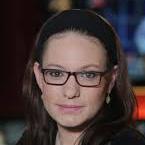


 BY SIVAN RAHAV-MEIR
BY SIVAN RAHAV-MEIR
This coming week begins the month of Elul. Many in the Jewish world return to their studies (may you be successful). Sephardim will start to say selichot, communal prayers asking for Divine forgiveness. And the sound of the shofar will be heard throughout the month of Elul, its siren call awakening something different in each of us.
I once heard the idea that in the month of Elul we need to turn our attention in two directions that are neglected throughout the year: within and above.
Much excitement has surrounded Emunah Cohen and Neta Lax, the two fresh winners of the annual International Bible Quiz. Yesterday I interviewed them and heard their story.
the first time?' Yet I simply forgot it. I thought afterwards that HaShem caused me to forget the answer in order to remind me that I do not know everything, that I am human and not perfect."
the first time?' Yet I simply forgot it. I thought afterwards that HaShem caused me to forget the answer in order to remind me that I do not know everything, that I am human and not perfect."
but now is the time for soul-searching and self-investigation. To check what we - not others - are doing. On the High Holy Days, our declaration is "Ashamnu, bagadnu" (We have transgressed, we have acted treacherously). It's about us and no one else.
the first time?' Yet I simply forgot it. I thought afterwards that HaShem caused me to forget the answer in order to remind me that I do not know everything, that I am human and not perfect."
"The more you learn," Neta said, "the easier it gets. When you learn a lot of Tanach (Bible) you simply see how everything connects to your life. I truly felt that what I learned accompanied me wherever I went. It made my heart feel good."
Within - toward self-improvement. Throughout the year, we tend to complain about events and people, whether in the news and or in our own lives. Sometimes the criticism is justified,
Much excitement has surrounded Emunah Cohen and Neta Lax, the two fresh winners of the annual International Bible Quiz. Yesterday I interviewed them and heard their story.
It turns out that they studied long hours together and were confident they would be the leading competitors. "We planned on winning together," Emunah revealed. "We thought both of us would answer every question correctly so that we would both be champions, tied for first place.
It turns out that they studied long hours together and were confident they would be the leading competitors. "We planned on winning together," Emunah revealed. "We thought both of us would answer every question correctly so that we would both be champions, tied for first place.
It turns out that they studied long hours together and were confident they would be the leading competitors. "We planned on winning together," Emunah revealed. "We thought both of us would answer every question correctly so that we would both be champions, tied for first place.
But in the end Emunah won. "They made a big deal about our big hug after I lost," Neta said. "But it was the easiest thing to share in her happiness. Besides, we were just relieved that the competition was finally over."
But in the end Emunah won. "They made a big deal about our big hug after I lost," Neta said. "But it was the easiest thing to share in her happiness. Besides, we were just relieved that the competition was finally over."
But in the end Emunah won. "They made a big deal about our big hug after I lost," Neta said. "But it was the easiest thing to share in her happiness. Besides, we were just relieved that the competition was finally over."
In the course of the entire contest, Emunah made only one error. "I knew the answer to the question: 'When did King David cry for
In the course of the entire contest, Emunah made only one error. "I knew the answer to the question: 'When did King David cry for
In the course of the entire contest, Emunah made only one error. "I knew the answer to the question: 'When did King David cry for
NETANYA 4 ROOM APT. RENTAL, Nitza Blvd, 1 month min. Amazing sea view, kosher, furnished: May, June, July 2023 from September 2023 short or long term
NETANYA 4 ROOM APT. RENTAL, Nitza Blvd, 1 month min. Amazing sea view, kosher, furnished: May, June, July 2023 from September 2023 short or long term APTNETANYA@GMAIL.COM
"The more you learn," Neta said, "the easier it gets. When you learn a lot of Tanach (Bible) you simply see how everything connects to your life. I truly felt that what I learned accompanied me wherever I went. It made my heart feel good."
"The more you learn," Neta said, "the easier it gets. When you learn a lot of Tanach (Bible) you simply see how everything connects to your life. I truly felt that what I learned accompanied me wherever I went. It made my heart feel good."

In closing, Neta declared: "The two of us will continue to study the Tanach. There were parts of the Tanach that were not in the material covered by the quiz, and it's important for us to learn them too."
Above - toward God through prayer. The gates of heaven are always open, but this month is considered an especially propitious time to connect with God. Recently they announced in the Corona Cabinet that "hope is not an action plan." That is correct, but to every action plan, it is necessary to add hope, optimism, and faith.
In closing, Neta declared: "The two of us will continue to study the Tanach. There were parts of the Tanach that were not in the material covered by the quiz, and it's important for us to learn them too."
In closing, Neta declared: "The two of us will continue to study the Tanach. There were parts of the Tanach that were not in the material covered by the quiz, and it's important for us to learn them too."
Here's wishing everyone a good month with lots of good news.
And Emunah had this recommendation: "Study the Bible for 5 minutes every day. Not for school, not for the Bible quiz, but just for how much fun it will be."
And Emunah had this recommendation: "Study the Bible for 5 minutes every day. Not for school, not for the Bible quiz, but just for how much fun it will be."
And Emunah had this recommendation: "Study the Bible for 5 minutes every day. Not for school, not for the Bible quiz, but just for how much fun it will be."
Sivan Rahav-Meir is a media personality and lecturer. Married to Yedidya, the mother of five. Lives in Jerusalem, and formerly served as the World Mizrachi Shlicha to North America. Sivan lectures in Israel and overseas about the media, Judaism, Zionism and new media. She was voted by Globes newspaper as most popular female media personality in Israel and by the Jerusalem Post as one of the 50 most influential Jews in the world.
Sivan Rahav-Meir is a media personality and lecturer. Married to Yedidya, the mother of five. Lives in Jerusalem, and formerly served as the World Mizrachi Shlicha to North America. Sivan lectures in Israel and overseas about the media, Judaism, Zionism and new media. She was voted by Globes newspaper as most popular female media personality in Israel and by the Jerusalem Post as one of the 50 most influential Jews in the world. NETANYA 4
Nitza Blvd, 1 month min. Amazing sea view, kosher, furnished: May, June, July 2023 from September 2023 short or long term


Sivan Rahav-Meir is a media personality and lecturer. Married to Yedidya, the mother of five. Lives in Jerusalem, and formerly served as the World Mizrachi Shlicha to North America. Sivan lectures in Israel and overseas about the media, Judaism, Zionism and new media. She was voted by Globes newspaper as most popular female media personality in Israel and by the Jerusalem Post as one of the 50 most influential Jews in the world.

42 TORAH TIDBITS 1528 / RE'EH OU ISRAEL CENTER 63 THE
DAILY PORTION BY
THE DAILY PORTION BY SIVAN RAHAV-MEIR
APTNETANYA@GMAIL.COM
OU ISRAEL CENTER 63
THE DAILY PORTION
APTNETANYA@GMAIL.COM
ROOM APT. RENTAL,
Securities offered through Portfolio Resources Group. Inc., member of FINRA, SIPC, MSRB, SIFMA U S B R O K E R AG E S E R V I C E S I N I S R A E L Get the Best of Both Worlds Kee p yo ur mo ney in th e US an d rec ei ve lo ca l exp er t in vestm en t advice 02-624-0995 054-599-9530 aaron@lighthousecapital.co.il www.aaronkatsman.com CALL
BOUTIQUE RESIDENCE FOR SENIORS IN THE LUXURIOUS
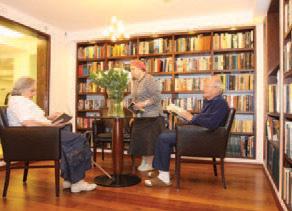



NEIGHBORHOOD OF ARNONA, JERUSALEM


Full calendar of activities and entertainment in English and Hebrew! Quality apartments built to high standards with balconies & gardens

A dedicated staff providing for all the needs of our senior citizens 24/7 -



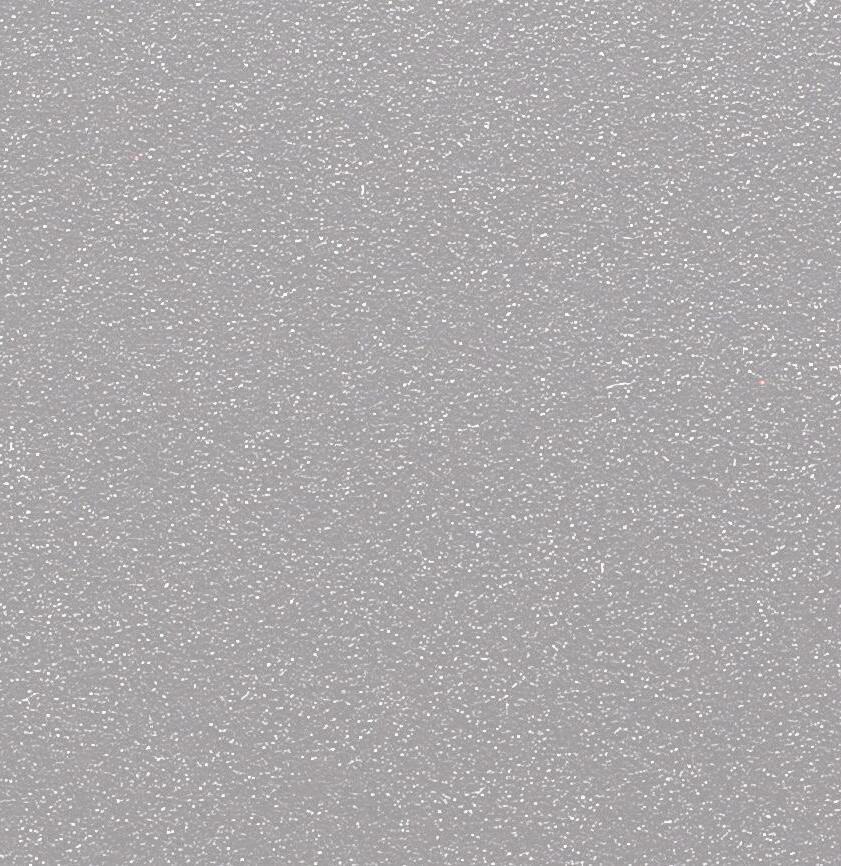









27 KOREH-HADOROT ST., JERUSALEM NEVE.SHALEM @GMAIL.COM | WWW.NEVE-SHALEM.CO.IL
SINCESINCE19951995
SMILES Faculty, OU Israel Center
Tremendous Tzedakah
One of the major themes found in the parahshat hashavua is the mitzvah of giving tzedakah. Aside from the money one distributes to the needy when asked, we are mandated to give at least a tenth of our income to the poor. This mitzvah carries with it many rewards and dividends.
Rambam in Hilchot Matanot L’evyonim notes that no one ever becomes poor from giving tzedakah. The Sefer Hachinuch adds that giving tzedakah is a medium of connection to Hashem and creates a conduit of blessing from Above. Conversely, those who are stingy blocks blessing from coming into their lives.
The Navi Malachi teaches that this is the only mitzvah with which one can test Hashem. “Havi’u et kol hama’aser el beit ha-otzar, vihi teref be-veiti, u’vechanuni na bazot, amar Hashem Tzivaot: im lo eftach lachem et arubot hashamayim, ve’harikoti lachem brachah, ad beli dai - Bring the whole of the tithes into the treasury so that there may be nourishment in My House, and test Me now therewith, says the Lord of Hosts, [to see] if I will not open for you the sluices of heaven and pour down for you blessing until there be no room to
suffice for it.” (Malachi 3:10) When one gives ma’aser, Hashem will repay him with tremendous bounty. The Chida, based on Sefer Chasidim explains that when one gives tzedakah and does not look at the recipient’s deeds, whether they are righteous or otherwise, likewise Hashem, measure for measure, will not look to see if we are deserving; His blessing will be showered with abundance.
The Torah teaches, “ pato-ach tiftach et yadecha” (Devarim 15:8), with regard to tzedakah, one should open his hands when giving. The Vilna Gaon derives a profound message from this verse. When one closes his hand in a fist, all of his fingers appear to be the same size. However, when one opens his hand, notice that the fingers are different sizes. Similarly, when giving to the needy, we should examine each person’s individual needs and give accordingly.
Rav Elya Lopian, z”l adds a deeper dimension to the act of giving. In the Selichot prayers we ask the “ machnisei rachamim ” to bring our kindness before the Master of Kindness. Who are these angels of kindness? Explains Rav Lopian, these are the beggars who knock on our door asking for a donation. Each person who asks us for a donation or for a favor is an “angel,” a messenger sent from Above to gift us with an act of kindness, so we can be worthy of
44 TORAH TIDBITS 1528 / RE'EH REBBETZIN SHIRA
kindness. Rav Pam, z’l explains that this idea is reflected in the Thirteen Middot of Mercy. We extol Hashem as the “Rav chesed ve’met .” Why the focus on the middah of emet, truth? Notes Rav Pam, at times Hashem wants to do kindness with us but we are not deserving of kindness. Therefore, Hashem gives us an opportunity to do an act of kindness, thus rendering us deserving of the rav chesed from the aspect of truth.


Rav Biderman in Be’er Hachayim, quotes the Zohar Hakadosh -when Hashem wants to give a ‘gift’ to someone, He sends them a shaliach to ask for a donation. We can view giving tzedakah as a great merit, a mitzvah we have been gifted to perform. In particular, Elul is a time to increase our giving, thereby opening the conduit of mercy from Above into our lives. For
September

OU ISRAEL CENTER 45
information: Dr. Evelyn Rappoport PSY.D. NY LICENSED PSYCHOLOGIST / PSYCHOANALYST drevrapp@gmail.com | 052.616.9881
BLENDING, BONDING & TRANSMITTING LEGACIES SUPPORT ● UNDERSTAND RE-IMAGINE ● EXPLORE
more
Mindful Grandparenting
Sundays 10-11:30 on Zoom
the series
15: 600 ₪ for the series The Group is limited to only 8 participants!
3, October 1, October 29, November 5, December 3 & 17, 2023 Early registration by August 15: 550 ₪
After August
RABBI JUDAH MISCHEL
Mashpiah, OU-NCSY Executive Director, Camp HASC Author of Baderech: Along the Path of Teshuva (Mosaica 2021)

“Give, Surely…”
Reb Dovid Leib Schvartz, a Viznitzer chasid endearingly referred to as der Heiligeh Schnohrer, ‘the Holy Beggar’, was a beloved and well known gabbai tzedakah in Bnei Brak. One of the neighborhood’s recognizable, holy characters, he lived with his wife in a single room apartment, and was ‘a regular’ at the shteiblach and minyan factories across the city, and always seem to appear wherever and whenever Jews gathered, shlepping his large plastic tzedakah bucket. He was there for every funeral and simchas for decades, collecting whatever he could for local aniyim, stricken with poverty or illness. Rain or shine, he could be found with his bucket in hand, tirelessly collecting tzedakah for those in need. When Reb Dovid Leib entered the room, Rav Chaim Kanievsky, zt’l, would stand in his honor.
Reb Dovid Leib was completely dedicated to others, yet he himself lived in complete poverty; he was a baal yisurin who, despite his own suffering, refused to take a single agorah for himself and his wife. He could also be found learning sifrei Kabbalah at all hours of the night in one of the local shuls.
At weddings, he would circulate among the guests during the seudah, wishing
them mazel tov and enabling them to do the great mitzvah of tzedakah. Among the guests, there were sometimes those who were not thrilled that their meal was interrupted. They would begrudgingly reach into their pockets and flip a couple of coins into his bucket. Once, he approached an unhappy person who was at that moment overeager to dig into his schnitzel. This man suddenly lost his temper and slapped Reb Dovid Leib across the face. An embarrassing scene unfolded in front of the large crowd, but Reb Dovid Leib was not fazed in the slightest. Barely flinching from the blow, he replied with absolute calm: “Ah! Good, good. That was for me…but what about something for the aniyim?”
Our sedra focuses our attention on the importance of being attuned to the needs of our brothers and sisters, and ‘doubles down’ on the obligation to give tzedakah:
If there will be among you a needy person, from one of your brothers in one of your cities… you shall not harden your heart, and you shall not close your hand from your needy brother. Rather, open, you shall surely open your hand to him, and you shall lend him sufficient for his needs, which he is lacking. (15:7-8)
46 TORAH TIDBITS 1528 / RE'EH
… ךירעׁש ד חאב ךיחא דחאמ ןֹויבא ךב היהי־יכ ךיחאמ ךדי־תא ץֹפקת אֹלו ךבבל־תא ץמאת אֹל טבעהו ֹול ךדי־תא חתפת חֹתפ־יכ :ןֹויבאה ֹול ר סחי רׁש א ֹורֹסחמ יד ונטיבעת
The double language of חתפת חתפ, ‘open, you shall surely open’ paints a visual cue as it implores us to open both of our hands in generosity. The verse is also preceded and followed by two mitzvos of giving: separating tithes and observing shemitah. In dedicating a tenth to charity, we express in action our belief that we are not the ultimate owners of our possessions. During shemitah, one demonstrated radical emunah by forgiving the loans he had extended, as well as setting free his indentured servants once their rehabilitative service was complete. Both commandments involve open-handedness, ח ת פ ת חֹת פ a relinquishing ownership and letting go, and a deep trust in HaKadosh Baruch Hu.
These Torah continues:
Give, you shall surely give to him, and your heart shall not be grieved when you give to him; for because of this thing Hashem will bless you in all your work and in all your endeavors…you shall surely open your hand to your brother, to your poor one, and to your needy one in your land. (15:10-11)
On this subsequent occurrence of doubled terminology, ֹול ן תת ןֹותנ, “give you shall surely give,” Rashi interprets: םימעפ האמ וליפא, “... even if you do it one hundred times (give readily and without regrets).” We may be able to feel some happiness while performing a single act of limit-stretching generosity — but the true test is in repetition.
A Jew in dire straits, collecting desperately needed funds for his family, once arrived at the door of Reb Mendel Riminov and poured
out his troubles before the tzadik. The Rebbe warmly turned over a large donation. Then, as the Yid turned to leave, the Riminover stopped him and handed him an additional kopek. A curious onlooker asked, “Rebbe, why give him tzedakah twice?”
Reb Mendel responded: “The first time, I gave him because his crying melted my heart. Hearing all his tzaros, I was overwhelmed and gave him as much as I had. After I searched my coat pockets again, I found one more coin. And this I gave to him for the sake of the mitzvah of tzedakah.”
As the Riminover explains, this is the intended meaning of the doubled language of the pesukim in our sedra, חתפת
Giving has to be done twice. The first act is for ‘our sake’, to open our hearts to empathy, compassion and generosity. This level of tzedakah fulfills our own needs: to give, to let go of the feeling of ownership and entitlement, to have emunah that Hashem will continue to provide for us, and to express love to others. It brings blessing into ‘all our work and all our endeavors’. The second act is honestly just for the sake of the one in need.
May all of us have pockets filled with coins, wallets filled with cash, bank accounts that are overflowing with abundance and portfolios that are flourishing. No one, including ourselves, should lack anything. And also, if by chance, we become aware of someone in need, may our hearts open to give… and give again… and again. For giving tzedakah is certainly a blessing for us — but what about something for the aniyim?
We apologize for formatting Rabbi Mischel's article incorrecty in last week's edition of Torah Tidbits
OU ISRAEL CENTER 47
ללגב יכ ֹול ךתתב ךבבל ערי־אֹלו ֹול ןתת ןֹותנ לֹכבו ךׂש עמ־לכב ךיקֹלא ׳ה ךכרבי הזה רבדה ךינעל ךיחאל ךדי־תא חתפת חֹתפ…ךדי חלׁש מ :ךצראב ךנֹיבאלו
חֹתפ…ןתת ןֹותנ.
SIMCHAT SHMUEL
BY RABBI SAM SHOR Program Director, OU Israel Center


Our Sedra this week opens with the familiar pasuk:
Re'ay Anochi notein lachem hayom, bracha' uklala- See, I set before you today, a blessing "...and a curse
Rabbi Kalonymous Kalmish Shapira hy'd, zy'a, The Piaszecna Rebbe, offered a novel interpretation of our verse.
Re'ay Anochi notein lachem hayom, bracha uklala - See I, give Myself to you Hayom- Today and everyday....which can be a blessing or chas v'shalom a curse.
The greatest blessing that a Jew can experience, explains the Rebbe, is the comfort in realizing that Hashem is there with us HaYom- Today and everyday - even when we are experiencing trauma or pain, and the worst curse that one could ever experience is to imagine even for one day that Hashem is absent from our lives, that Hashem is not there with us always in joy and triumph as well as in sadness and difficulties.
Re'ay Anochi notein lachem hayom, Hashem, Anochi, gives himself to us HaYom- today and everyday.
Rabbi Yisrael Grossman zt'l notes that we must understand this verse as presenting us with the potential inherent within every single day.
Re'ay Anochi notein lachem hayomHashem has given us Hayom- Today- this day- to either bring blessing into the world through our actions, or chas v'shalom to
bring further harm and damage into this world through inappropriate or destructive choices and behavior.
The Kedushat Levi, Reb Levi Yitzchak of Berditchev zy'a , offers a similar interpretation of our verse, developing this important idea even further. Hashem gives us HaYom- each day- Hashem gives us each day as an opportunity through our actions, to be a source of blessing in this world, or through our failings, chas v'shalom , to bring consequences into this world. However the Rebbe explains that the greatest chesed is that this opportunity is renewed each and every day. Yesterday I may have come up short, but HaYomToday, I get another opportunity to indeed bring blessing into this world through my deeds and actions.
Yehi Ratzon, may we all merit to heed these two powerful teachings, and to experience these blessings today and everyday....Shabbat
Shalom
48 TORAH TIDBITS 1528 / RE'EH
UNITED HATZ
AL AH
UNITED HATZALAH
STRENGTHENING COMMUNITY SAFETY TOGETHER
HELP SAVE THOUSANDS OF LIVES EACH YEAR ACROSS ISRAEL.
PARTNER WITH US BY DONATING TODAY TO SAVE LIVES IN YOUR COMMUNITY, AND MANY OTHERS THROUGHOUT ISRAEL. TOGETHER WE CAN REACH THE GOAL OF RESPONDING TO ALL MEDICAL EMERGENCIES IN 90 SECONDS OR LESS.



OU ISRAEL CENTER 49
www.israelrescue.org
BY RABBI MOSHE TARAGIN R am, Yeshivat Har Etzion

Recovering A Lost Voice
On the eve of his death, Moshe desperately pleads with his nation to avoid the cultural contamination of the land they are about to enter. He reminds them that they are children of Hashem,'הל םתא םינב םכיקולא who must not sink into the local barbaric culture. Among the repugnant and banned Kna'anite abominations is physical disfiguration of the human body. In pagan cultures, human beings aren’t endowed with divine image and aren’t viewed as the masterpiece of creation. Showing little respect for human life or for their own bodies, paganists mutilated themselves to display grief over death.
By contrast, Jews, as the children of Hashem, must uphold the dignity of human life and respect the human body which, too, was crafted by Hashem. By avoiding physical defacement, the children of G-d uphold the dignity of Man.
THE BROADER VIEW
Thousands of years later, Moshe’s disciple, Rebbi Akiva, reaffirmed our status as children of Hashem, but framed it in a broader context. Rebbi Akiva, cited by a mishnah in Pirkei Avot, first acknowledges the divine image in every human being םלצב ארבנש םדא ביבח . Unlike any
other creature in the natural order, homo sapiens are endowed with intelligence, creativity, cognitive speech, moral conscience, emotions, consciousness, and free will. Despite living through one of the harshest periods of Jewish history and personally facing Roman brutality, Rebbi Akiva never lost faith in humanity and affirmed the divine potential within every human being.
Having accredited the divine image in every human being, Rebbi Akiva declared that Jews enjoy an even loftier status as children of Hashem and he quoted the pasuk in Re’eh םכיקולא 'הל םתא םינב.
In citing both the divine image in everyman and our exalted status as children, Rebbi Akiva showcased the delicate balance between Jewish particularism and universalism. We are placed on this earth to educate all of humanity about monotheism and morality. Selected by Hashem for this mission, we are beloved to Him as children. We alone embraced His Torah and His mission.
We are beloved because we are His. We are His because He chose us. He chose us to inspire His world. If we abandon our universalist mission of inspiring the world, we betray this “chosenness” and we abdicate the status as “His children”.
For a Jew, Nationalist identity and Universalist identity go hand in hand. If we shrink from universalist identity, our
50 TORAH TIDBITS 1528 / RE'EH GEULAS YISRAEL
mission fades and our selection withers. Alternatively, if our internal religious experience becomes diluted, we compromise the content of our message and our historical mission goes blank. A Jew must be both universalistic and particularistic. We can’t be one without the other.
INITIAL SUCCESS
During the initial stages of Jewish history, we successfully balanced particularism and universalism. We settled our homeland, promised us by Hashem, and built a Mikdash to house His presence. Yet we also spread His message across the globe. The ancient world was drawn to the city of Hashem and mesmerized by the spectacle of His people living in his city and abiding by His will. Our inner religious world was vibrant, and our broader universalist message was resonant.
Tragically we betrayed this mission. Twice, we failed to live by these lofty and grand expectations. Twice, we were evicted from our homeland and from our historical perch.
CONTRACTION
After the second eviction and the destruction of the second Mikdash, our universalism receded. Walking out of Yerushalayim, we contracted into the inner world of the beit midrash, Torah and mitzvah observance. Having lost our universalist agenda, we withdrew into an inner world of beauty and of grandeur.
In addition to our own retraction from universalism the world itself fell into cultural hibernation. Having destroyed the Mikdash and evicted the chosen people from Yerushalayim, humanity sunk into a 1500-year period of darkness. Riddled
BEAUTIFUL SPACIOUS BAKA FAMILY HOME FOR SALE
186 SQM SPLIT-LEVEL HOME WITH TWO 40M TERRACES

7 ROOMS, 3 FULL BATHROOMS, 2ND FL (31 STEPS), GREEN AND BRIGHT, PRIVATE PARKING, STORAGE, EXCELLENT CONDITION, CHURCHLAND UNTIL 2077 PRICE REDUCTION!!!
NOW ASKING NIS 5,200,000
1 BDRM APT RENOVATED AND BRIGHT ON RABBI HISDA ST JUST OFF TSOMET ORANIM, 2ND FLOOR, RENTED FOR 4500 NIS, AFTER PINUI BINUI OWNERS WILL RECEIVE A 3 RM APT BTWN 66-71 M, WITH 12 M BALCONY, PARKING AND STORAGE -CALL MICHAL FOR A SHOWING 052.4066620
ASKING PRICE NIS 2,150,000
Ilana Nelson 054.5341403
www.integrityrealestate.co.il

by war and violence, and stifled by ignorance and illiteracy, the Western world found itself trapped in a dismal and dreary tunnel called the Dark Ages. With our departure from the historical stage the world descended into darkness. The prospect of inspiring humanity to higher religious and moral ground seemed implausible.
In addition to our own lost voice, and humanity’s plunge into darkness, antisemitism also hampered our universalist agenda. As we suffered centuries of persecution it was preposterous to imagine that we could inspire the world. We were viewed as outcasts, not educators.
During the past two thousand years, our internal contraction, the calamity of the Dark Ages, and scourge of antisemitism all thwarted our universalist mission.
OU ISRAEL CENTER 51
EXCELLENT INVESTMENT IN PINUI BINUI PROJECT CLOSE TO EMEK REFAIM
Exclusive Botanical Garden family/group tours


3 HOUR UNIQUE VIEW of JERUSALEM TREASURE
Info & booking: 050-6238384 gismabracha@gmail.com
RECOVERING A LOST VOICE

History has turned. In the leadup to the end of time humanity has slowly recovered its tzelem elokim, and is gradually readying itself to be, once again, inspired by our people. Over the past 500 years humanity has yanked itself out of the shadows and has launched major revolutions advancing the human condition. The world is inching closer to a state of “readiness” to be inspired to Hashem by His children. Are we ready? Are we capable of reclaiming our universalist voice? Have we forgotten that every person possesses this divine image and divine potential, and that it is our duty to inspire them. After two thousand years of turning inward, can we now, also turn outward, without diluting our inner world? This shift of consciousness and of national identity may take time. However, it is a crucial shift for history to continue its moral and religious evolution.
As Rabbi Sacks wrote, “religious thought has not fully caught up with this development. Modernity confronted Jews as a series of traumatic onslaughts. First the assimilatory demands of European emancipation, then the rising tide of racial anti-Semitism, then the nightmare of the Holocaust, and finally the challenge of forging a new nation in Israel under pressures internal and external that might easily have defeated a less hardy people. Distress inhibits prophecy because it makes

people turn in on themselves rather than outward to the world and to God.
Our people he wrote, “has not yet recovered its poise scope intellectual breath or prophetic depth in the past half century it has produced two few prophets so men and women sufficiently gifted in the arts of listening to time and eternity the particularity of Jewish existence and the universality of human concern to hear in God's word for all time the specific cadences of the word for this time yet this too will come.”
We are Hashem’s children. We must inspire all of His creatures.


52 TORAH TIDBITS 1528 / RE'EH
and FALL-PREVENTION
for OLDER ADULTS Shabbos Bistro Premium delicious shabbes meals Openning hours: Thursday 12 pm-2 am Friday 8 am-3 pm 02-9964469 | 054-8777347 Iben Shafrut 5, Rehavia, Jerusalem
TUVIA ANDY HAAS BALANCE
SPECIALIST
It's Here!
It's Here!
Livestream Broadcast
Livestream Broadcast
August 16th, 2023
August 16th
Tune in for a 7:00 AM
Tune in for a 7:00 AM
arrival in Israel
arrival in Israel




(* Time subject to change)
(* Time subject to change)
WWW.NBN.ORG.IL/LIVE
WWW.NBN.ORG.IL/LIVE
Summer Charter Flight
Summer Charter Flight
HAFTORAH
BY REBBETZIN DR. ADINA SHMIDMAN INSIGHTS


The King's Garden: Understanding the Duality of Body and Soul
This week, we continue the series of ten Haftorot that are connected to the time of year rather than a haftorah thematically related to the weekly Parsha. The seven Haftorot that follow Tisha B’Av are known as the Shiva d’Nechemta, the Seven Haftarot of Consolation. This week’s Haftorah is the third of the Haftorot of consolation.
And all your children shall be disciples of the LORD, And your children’s peace will be abundant.
The Midrash Aggadah on Vayikrah 5:1 describes a dispute between the soul and the body. Each one claims innocence from sin - the soul blames the body for acting on the devious thought and the body accuses the soul of its nefarious plans. The Midrash offers a parable to appreciate the tension between the body and soul. A king has a garden with beautiful fruit trees. As he is worried that his workers will steal the fruit, he hires two watchmen - one who is blind and cannot see the beauty of the trees and one who is lame and is unable to easily move around. When the two men are left alone however, they come up with
a clever plan to steal the alluring fruit. “Climb up on my back”, says the blind man to his lame partner in crime. “You will guide me and I will carry you and we will be successful in our mission”. Together they are successful and steal the fruit. When the king realizes that the fruit was stolen, he calls the two guards and accuses them of the crime. Each one denies the accusation, the blind man claiming he can’t see and the lame man saying he can’t walk. The king, no fool, says, “Perhaps alone you would be unable to accomplish this heist but together...you certainly can.”
This parable describes the relationship between the soul and the body, the Neshama and Guf. While each cannot act on its own, together they are able to sin. When Hashem will ask the soul why it violated the Torah strictures, the soul will claim that it was that the body sinned while the body will blame the soul. Hashem however recognizes that it was the two together that sinned and will judge the soul and body together as one.
The Midrash cites our posuk in Yeshayahu to describe the ultimate and ideal soul and body relationship. When all of your
54 TORAH TIDBITS 1528 / RE'EH
ך י נ ב םֹולׁש ב ר ו ’ה יד ומל ך י נ ב־ל כ ו
because Sinai physical mitzvot matters. that voice, afterI canFor no foland comreal amazing teachreceived us

Smadar 050-3114040 // 02-642-4329
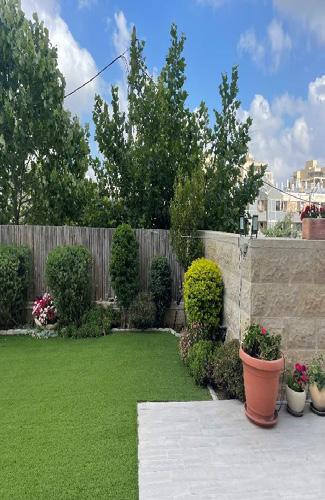
smadi_bida@walla.co.il
PRI
Monday mornings 10.30-12.30
For more details, call Ruth 02-628-7359

1221
Real Life Rescues
Real Life Rescues
EMT Saves Baby from Severe Allergic Reaction Following First Taste of Tahini
3-Days-Old Baby Chokes on Breastmilk, Saved by United Hatzalah Volunteer EMT
Tel Aviv - Just before 2 PM on Wednesday a 3-day-old newborn choked on breastmilk at an apartment in north Tel Aviv. The baby and her mother had just gotten back from the hospital that day, and the panicked new mother immediately alerted emergency services.
On a recent Tuesday morning in Jerusalem, parents were feeding their 6-month-old baby and introduced him to tahini for the first time. Within minutes, the baby developed a severe allergic reaction. The infant's parents immediately called emergency services, seeking urgent help.
United Hatzalah volunteer EMT Jeremy Hirsch was shopping in a nearby Superpharm when his communications device beeped, notifying him about a baby choking in the area. While he was wearing flip-flops, a bathing suit, and a tank top, the volunteer did not hesitate to drop everything and respond to the call. “I usually don’t go on calls when I’m dressed like this, but for a choking baby, I go no matter what,” he later recounted. “I’m a father, and I know what it means.”
United Hatzalah volunteer EMT Shalom Klein, alerted to the emergency through his proximity alert system, sprang into action as the first responder on the scene. Arriving promptly, Shalom was confronted with a distressing sight - a baby boy with swollen lips and tongue, struggling to breathe, and covered in a worrisome rash.

He hurriedly left Superpharm and rushed on his bike to the apartment where the baby and his family were located, arriving just a few moments later. Upon approaching the building, Hirsch found the baby’s mother anxiously waiting downstairs. He asked about the baby’s condition and age. The mother said that her 3-day-old infant was still choking, causing Hirsch to spring into action with an extreme sense of urgency.
Inside the room were the mother, grandmother, and aunt, who was holding the baby in an upright position. Observing the infant’s distressing condition, Hirsch noted, “Bubbles were coming out of her nose, she was conscious but not breathing, her skin was dark red and turning purple in the lower extremities.”
Recognizing the symptoms as indicative of an anaphylactic shock, the volunteer knew immediate intervention was crucial. Without hesitation, he administered a life-saving EpiPen injection, delivering a dose of epinephrine to counteract the severe allergic reaction. The powerful medication quickly took effect, and the infant's breathing became less labored. The swelling in the lips and tongue began to subside, providing much-needed relief to the child.
As the symptoms continued to recede, the EMT monitored his condition while awaiting the arrival of a mobile intensive care ambulance. Several minutes later, the ambulance team arrived and transported the infant to the nearest hospital for further treatment and observation.
Hirsch positioned the baby face down, making sure to always support the infant’s head and neck, and prepared to perform the necessary back blows to clear the airway. Suddenly, Hirsch felt something warm on his hands.
“I looked down on my hands and saw white fluids and understood that the baby had just expelled some of the milk she had choked on,” Hirsch explained.
Hirsch lifted the infant upright, and she began to cry and regain a normal color, signs of a cleared airway. As they waited for the intensive care ambulance to arrive, Hirsch handed the baby back to the mother and reassured her that the danger had passed and that the baby was safe once more.
The volunteer later said, “I respond to a lot of calls involving babies in my area. I had to perform the same maneuvers on my 6-month-old child once, and I know what it means for a parent to see their baby in this situation. I feel sorry that this is how this new mother’s first day out of hospital after the birth looked like but am glad I was able to be there to help.”
Reflecting on the incident, Shalom emphasized the importance of having an EpiPen readily available. "It's a great thing I had an EpiPen in my medical kit," he stated. "An EpiPen can save a person's life within minutes and is a huge help for both EMTs and patients."
OU ISRAEL CENTER 55
actions are as your children and are the teachings of G-d, there will be Shalom, peace between the soul and the body as they both engage in the holy mission of serving Hashem. With the month of Elul approaching let us work to this spiritual synthesis between body and soul and may all of our actions be the true teachings of Hashem and usher in an era of everlasting peace.
For Sale: Ben Maimon, 4 rooms, 113m, 2 bathrooms, porch, 1st floor, elevator,
NIS
Rabbi Jonathan Shulman, Director of OU-JLIC in Israel shulmanj@ou.org
6.2 million
WRITING WORKSHOP AT THE
ISRAEL CENTER
HADASH WOMEN'S
OU
Gilinski Real Estate Your realttor in Jerusalem We have 2 garden apts one in Ganai Tzion and one in Arnona! Contact us for more info! N Nahum Glatzer 050-7225694
FROM THE VIRTUAL DESK OF THE OU VEBBE REBBE
RAV DANIEL MANN
Can One Fix an Unwarranted Beracha on Netilat Yadayim?
acted without kavana for what is considered a mitzva.


QUESTION: I came out of the bathroom and did netilat yadayim for that purpose, but accidentally I recited the beracha of netilat yadayim. I tried to salvage the situation by indeed eating bread as fast as I could. Did that help?
ANSWER: We wash our hands after using the bathroom without a beracha because it is not the fulfillment of a formal mitzva but is necessary to have clean hands for reciting matters of sanctity and for removing ruach ra’ah. (There is a beracha if it is right before Shacharit – Mishna Berura 4:30.) While it is unclear whether one should use a cup for this washing (see Living the Halachic Process, II, H-10), you apparently did. This made your washing fit for netilat yadayim for a meal (Shulchan Aruch, Orach Chayim 159:1), except that you lacked intent for that purpose.
We understand that your mistake was not that you thought you were washing to eat or that washing after the restroom is a formal obligation that includes a beracha. Rather, you washed without intention for the formal mitzva, and the beracha slipped out due to rote (i.e., you often make a beracha after washing with a cup). Thus, you
What you did, eating bread based on a properly performed netilat yadayim without the intention for a meal (and, thus, without a beracha) is the subject of a machloket without a clear ruling (see Shulchan Aruch and Rama, OC 158:7). This includes where one washed for eating food that was dipped in liquid, where Halacha mandates washing without a beracha due to doubt (see ibid. 4&7). The Rama therefore instructs to repeat netilat yadayim, again without a beracha because of the possibility that the first washing got the job done (Mishna Berura ad loc. 32). The opinion that the netila without kavana to eat now is valid means that there is no need for another netila before the meal; he did not fulfill a mitzva with it (see Chazon Ish, OC 25:8).
Does inserting kavana to eat based on the netila, at least within a moment (toch k’dei dibbur) of the recitation give significance to the recitation? The broad idea of fixing things toch k’dei dibbur has limitations (see Sdei Chemed vol. VI, p. 327), and I did not find precedent of it giving a quality to an action done before it (see Yabia Omer II, OC 16).
56 TORAH TIDBITS 1528 / RE'EH
תמשנ יוליעל ל"ז ןמצלז לאיזוע םהרבא ןב םירפא לאוי
The Orthodox Union - via its website - fields questions of all types in areas of kashrut, Jewish law and values. Some of them are answered by Eretz Hemdah, the Institute for Advanced Jewish Studies, Jerusalem, headed by Rav Yosef Carmel and Rav Moshe Ehrenreich, founded by HaRav Shaul Yisraeli zt”l, to prepare rabbanim and dayanim to serve the National Religious community in Israel and abroad. Ask the Rabbi is a joint venture of the OU, Yerushalayim Network, Eretz Hemdah... and OU Israel’s Torah Tidbits.



Even if the intention could reach back to fix the beracha, the following source indicates that a beracha cannot fix the nature of the preceding netila. The Magen Avraham (158:13, accepted by the Mishna Berura ibid.) says that one cannot make a beracha after a netila without kavana because a beracha is incongruous to such a lacking netila.

One can still argue that the fact that the netila was used for the meal (according to the opinion that it works) does give it and its beracha some significance after the fact, considering the two are connected. While not negating the plausibility of that contention, the following Ritva illustrates that the washing and eating are not fully connected. The Ritva (Chulin 106b) says that one who did netilat yadayim with a beracha because he was planning to eat may change his mind and not eat, because the netilat yadayim at its time, based on the plans at that time was required; after the mitzva was completed, it is irrelevant if the meal materializes or not. He spells out that the eating is only the trigger for the obligation of netilat yadayim; it is not the end of the mitzva process (admittedly, not everyone understands it this way – see S’dei Chemed ibid., p. 328). In our flipside case, your eating is unlikely to change things retroactively, as the netilla was done without obligation.
The following would have been the best way to salvage as much as possible, besides reciting baruch shem k’vod … on
the beracha (Shulchan Aruch, OC 206:6). We saw that to eat bread, you needed a second netilat yadayim, without a beracha. Since the beracha on netilat yadayim can work before the washing (Shulchan Aruch, OC 158:11), intending that your beracha go on that second washing might have helped (analysis beyond our scope).

OU ISRAEL CENTER 57
JerusalemTalpiot - 3 Bedrooms - 3 25 M NIS Givat Masuah - 3 Bedrooms - 2.95M NIS German Colony - Duplex Penthouse - 11 9M NIS Yemin Moshe - 4.5 Bedrooms - 6M NIS Kiryat Yovel - Amazing Views - 4 Bedrooms - 3.78M NIS Rehovot2 Bedrooms - 2 18M NIS 3 Bedrooms - 2.61M NIS Ra'anana3 Bedrooms - Garden Apt - 4 35M NIS 2 Bedrooms - 12 sqm Porch - 2.75M NIS 4 Bedrooms - Garden Apt - Quiet St - 4 09M NIS Nahariya - Sea Views 4 Bedrooms - Low Floor - New - 1.63M NIS 4 Bedrooms - Sea View - New - 1.8M NIS Netanya - Sea Views Nth. Netanya - 4 Bedrooms - 3.25M NIS Ashkelon - Sea Views - Close to Marina 5M NIS 1M NIS The Israel Real Estate Market is Not On Vacation ! Wherever You Want To Live or Invest Great Opportunities Exist Today! Izzy Leizerowitz 972.52.682.9367 USA - 786.385.8859 Broker Fee 2%+ VAT Having a dispute? For a Din Torah in English or Hebrew contact ‘Eretz HemdahGazit’ Rabbinical Court: 077-215-8-215 • fax: (02) 537-9626 beitdin@eretzhemdah.org
TORAH VEHA'ARETZ INSTITUTE BY RABBI MOSHE BLOOM en.toraland.org.il

Pruning Peaches During Shemitah Within the Otzar Beit Din Framework

Recently, the rabbis of Machon Torah VeHa'aretz set out for the Golan Heights for a tour marking the end of shemitah.
One of the stops involved pruning peach trees. During shemitah, the farmer, Avraham Sadeh, a religious Jew, grew otzar beit din peaches, near Moshav Avnei Eitan.
Normally, in the summer, after the peaches are harvested, the branches are pruned. The goal is to stimulate growth and promote general tree vigor, in order to cause the young shoots to sprout branches and fruit during the following year. Furthermore, pruning the exterior branches exposes the interior branches to much-needed light. Without pruning, the quality of the following year’s crop will be extremely poor.
Last summer, during shemitah , the farmer approached us with a question, we headed up north to see for ourselves. The issue was how much damage would be caused to the tree – both short term
(during the eighth year) and long term (in subsequent years) – if the trees were not pruned during shemitah . We consulted with Rav Yaakov Ariel, Torah VeHa'aretz’s head, about this difficult question.

In the end, the farmer decided to be machmir, and he did not prune his trees. As a result, this year’s harvest was large but of extremely poor quality. Since too many branches remained on the trees, the peaches were all very small, and thus the farmer earned significantly less than in previous years. In addition, due to the large number of branches, the fruit and branches in the middle of the trees did not get enough sunlight, and therefore they did not develop properly.
“I don’t regret that I lost money during the eighth year because of shemitah,” Mr. Sadeh told us.
We are currently working on precise guidelines, which will be published before Shemitah 5789, for farmers, kashrut supervisors, and the Ministry of
58 TORAH TIDBITS 1528 / RE'EH
Agriculture’s professional advisers.
This question was only one of the hundreds of halachic-practical questions facing the rabbis of the beit din, when growing fruits and vegetables within the otzar beit din framework while strictly adhering to all the shemitah laws and the permitted and prohibited melachot of shemitah.
Baruch Hashem that we were privileged to do so!
DOROT - The OU Women's Intergenerational Choir

Director Hadassah Jacob 052-384-7230
Monday Evenings 7:00 - 9:00pm
Resumes Sept 4th
THIS WEEK: PLEASE HELP a family of seven children desperately trying to start their business but are unable to subsist monthly.
Can you help?
• Checks:
Make out to “Yesh Ezra”
Send to: Yesh Ezra, POB 31476, Romema, Jerusalem, 9136101

• Bank Transfer: Bank Mercantile (17), Branch 642, A/C 79747843, Yesh Ezra To obtain your tax benefit receipt, send details by Whatsapp/email.
• Credit card:
Sara at 077-820-0196

Sunday, Monday, and Wednesday (10:15am - 2:45pm)
• Website: www.yeshezra.org
Click on “Donate Now”
Inquiries:
Menachem Persoff 050-570-1067
menpmp@gmail.com
OU ISRAEL CENTER 59

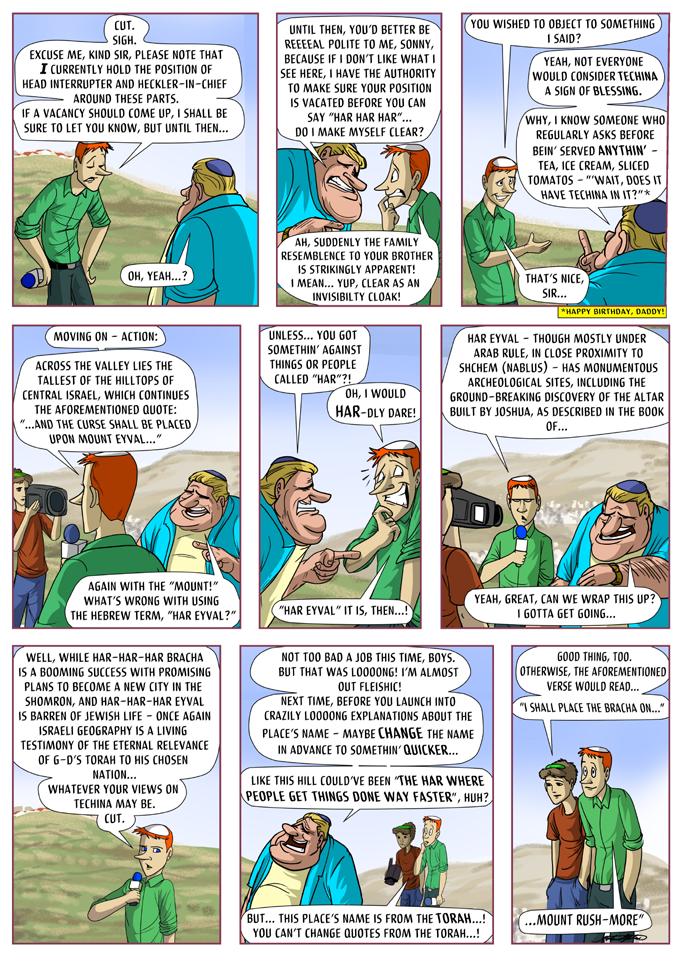
TORAH 4 TEENS
BY TEENS NCSY ISRAEL

 Rabbi Yosef Ginsberg Regional Director, NCSY Israel
Rabbi Yosef Ginsberg Regional Director, NCSY Israel

The After Life
14:1 - You are children of the Lord, your God. You shall neither cut yourselves nor make any baldness between your eyes for the dead.
This week’s Parsha, Re’eh has some of the most inspiring and beautiful statements for the Jewish people. Annually when we are on our way out of the challenging month of Av and into the awe-bearing yet closeness of Elul, it is always nice to encounter the pasuk of 14,1, “You are children of the Lord, your God.” Yet, the continuation of the pasuk immediately and awkwardly ruins the vibe; “You shall neither cut yourselves nor make any baldness between your eyes for the dead.”
Rashi tells us that the forbidden act of ‘lo titgodedu’- ‘not to cut ourselves’ is related to a form of connection and communication with the dead done by the Amorites thereby making it forbidden. But what is the connection with us being the children of Hashem?!
The Rabbeinu Behaye gives a beautiful explanation of the juxtaposition of these two ideas. He explains that this act of the
Ammorites was core to their mission since the Ammorites considered this world to be the essence of existence. Therefore, when one of the Ammorites died, it’s as if the essence of all their existence was lost. We, though, “are children of the Lord, your God”. A God whose existence supersedes the confines of life and death and physicality of this earth.
This is the reason why according to the Rabbeinu Behaye that this forbidden act is written with the statement of communicating with the dead. If we are children to Hashem (which we are!) then our death does not change our connection and relationship with those who are his children. Our legacy overrides this world and stays forever.
May we all be able to tap into the Godliness within ourselves and recognize ourselves as God’s children.
Noya Schleider 12th Grade, Netanya

Life's Choose-Your-OwnAdventure
This week's Torah portion opens with Moshe saying to Am Yisrael, "See, I present before you today a blessing and a curse." This verse serves as a reminder that in our lives we are constantly faced with choices and the decisions we make have consequences.
The parsha emphasizes the importance
62 TORAH TIDBITS 1528 / RE'EH
ודדֹגתת אֹל םכיקֹלא 'ה-יל םתא םינב- 'א:ד״י תמל םכיניע ןיב החרק ומיׂש ת־אֹלו
of choosing righteousness and being cautious of false prophets and idolatrous influences, it teaches us how to tell from what is true and what is misleading, reminding us to follow the right path.
Today the message of Parshat Re'eh stays relevant. Every day we are faced with many choices that shape who we are. As the youth of our generation, this is especially relevant as we navigate through these years. The choices we make tremendously impact our future. The parsha encourages us to choose the path of righteousness and follow Hashem's commandments. This doesn't just mean blindly following the rules, but rather understanding the moral meaning behind them, embracing kindness, compassion, honesty, and empathy as values in our lives.
The parsha also highlights the concept of teshuvah. Sometimes, our surroundings

may lead us astray, and we might encounter moments where we become weak and make mistakes or choose the wrong path. The Parsha teaches us that it is never too late to turn back and make amends. It is essential to use these opportunities to improve ourselves.
Just like Am Yisrael was promised blessings for following Hashem's ways, if we make the right choices, we will experience benefits such as personal growth, strengthened relationships, and a sense of purpose.
As we read Parshat Re'eh, let's embrace the power of choice. Let us choose to see beauty and opportunity in life, even when it's difficult. May we have the courage to stand by our values and make decisions that help improve ourselves and the world. By doing so, we can become a source of blessing and positivity.
Shabbat Shalom.
OU ISRAEL CENTER 63
Brickstone specializing in safety deposit vaults is opening its new branch to residents of Jerusalem and surrounding areas in the Clal Building. At your service are safety deposit boxes of various sizes to store your valuables. The center is secured 24/7 at the most stringent international standards. The location and boxes are secured by Lloyds International.

64 TORAH TIDBITS 1528 / RE'EH דסב Security European Standard Biometric Identification Armored Vault Sophisticated Alarm CamerasSystem 24/7 Comprehensive Security
9936
Your peace of mind Our responsibility
Brickstone Safes have come to Jerusalem!
The bank closed… We’re here! Safety deposit box rental and appointment coordination Ext. 2 Clal Building, 97 Yafo Street, Jerusalem (former Discount Bank building ) sophisticated cameras 180 NIS discount for those who bring this ad!










 Rabbi Avi Berman Executive Director, OU Israel aberman@ouisrael.org
Rabbi Avi Berman Executive Director, OU Israel aberman@ouisrael.org



































































































































































 BY SIVAN RAHAV-MEIR
BY SIVAN RAHAV-MEIR


























































 Rabbi Yosef Ginsberg Regional Director, NCSY Israel
Rabbi Yosef Ginsberg Regional Director, NCSY Israel



